
Graduate Research Fellowship Program

What is GRFP?
Fellowship benefits.
- Five year fellowship period with three years of financial support
- Annual stipend of $37,000
- Cost-of-education allowance of $16,000 to the institution
- No post-graduate study service requirement
- Access to supplemental funding to sustain research while on medical deferral (e.g. family leave)
Learn More »
Am I Eligible ?
To be eligible for the NSF GRFP, you must:
- be a US citizen, US national, or permanent resident
- intend to pursue a research-based Master’s or Ph.D. program in a GRFP-supported field
- be enrolled in an eligible program at an accredited United States graduate institution, with a US campus, by fall following selection
- be at an early stage in your graduate career
- have completed no more than one academic year of full-time graduate study (or the equivalent)
- Graduate students are limited to only one application to the GRFP, submitted either in the first year or in the second year of graduate school
Click here for more information
What's My Level?
Application level selection.
The GRFP Application requires you to select the academic level that best describes the stage of your academic career. Use the GRFP Academic Level Questionnaire to help you select the appropriate academic level in your application. Levels are determined as follows:
Level 1. You have not previously enrolled in a graduate degree-granting program, but plan to start graduate study next fall. Includes undergraduates in the final year of a bachelor’s degree program and individuals who previously earned a bachelor’s degree.
Level 2. First year graduate student currently enrolled in a graduate degree-granting program, who has never applied to GRFP before as a graduate student or returning graduate student, or a student currently enrolled in a joint bachelor’s-master’s degree program (must have completed three academic years in program).
Level 3. Second year graduate student who has completed no more than one academic year of graduate study while enrolled in any graduate degree-granting program, does not have a graduate degree, and has never applied to GRFP before as a graduate student or returning graduate student.
Level 4. Returning graduate student who is not currently enrolled in a degree-granting program, and may have more than one academic year in a graduate-degree granting program and/or a master’s or professional degree, followed by an interruption of at least two years just prior to the GRFP application deadline. Note: address the reasons for the interruption and why you should be considered to be in the early stages of your graduate education in the Personal, Relevant Background and Future Goals Statement.
GRFP recognizes and supports outstanding graduate students who have demonstrated the potential to be high achieving scientists and engineers, early in their careers. Applicants must be pursuing full-time research-based master’s and doctoral degrees in science, technology, engineering, and mathematics (STEM) or in STEM education at accredited US institutions.
- Oct. 17, 2022 - Life Sciences
- Oct. 18, 2022 - Computer and Information Science and Engineering, Materials Research, Psychology, Social Sciences, STEM Education and Learning
- Oct. 20, 2022 - Engineering
- Oct. 21, 2022 - Chemistry, Geosciences, Mathematical Sciences, Physics and Astronomy
- Oct. 28, 2022 - 5:00 PM ET
- Aug. 31, 2022 - 11:15 AM to 1:15 PM ET Info for Applicants Webinar 1
- Sept. 21, 2022 - 11:15 AM to 1:15 PM ET Info for Applicants Webinar 2
- Sept. 28, 2022 - 11:15 AM to 1:15 PM ET Reading the Fine Points of the GRFP Solicitation Webinar
NSF welcomes scientists and engineers to serve as reviewers of GRFP applications. Serving as a GRFP Reviewer is an excellent opportunity to apply your research and career expertise to help identify future science and engineering leaders.
- Sep. 15, 2022 - 5:00 PM ET
- Nov. 1, 2022 - 11AM to 1 PM ET Reviewer Training Webinar #1
- Nov. 4, 2022 - 2 PM to 4 PM ET Reviewer Training Webinar #2
- Nov. 10, 2022 - 2 PM to 4 PM ET Reviewer Training Webinar #3
- Nov. 15, 2022 - 2 PM to 4 PM ET Reviewer Training Webinar #4
Reference Writers
Reference letters are a key component of a strong GRFP application package. The most effective reference letters provide detailed and specific information about how an applicant meets the NSF Merit Review Criteria of Intellectual Merit and Broader Impacts.
- Oct. 5, 2022 - 11:15 AM to 1:15 PM ET Info for Reference Writers & Research Mentors
- Oct. 6, 2022 - 11 AM to 1 PM ET Reference Writers Webinar
An official website of the United States government
Here's how you know
Official websites use .gov A .gov website belongs to an official government organization in the United States.
Secure .gov websites use HTTPS. A lock ( Lock Locked padlock ) or https:// means you've safely connected to the .gov website. Share sensitive information only on official, secure websites.
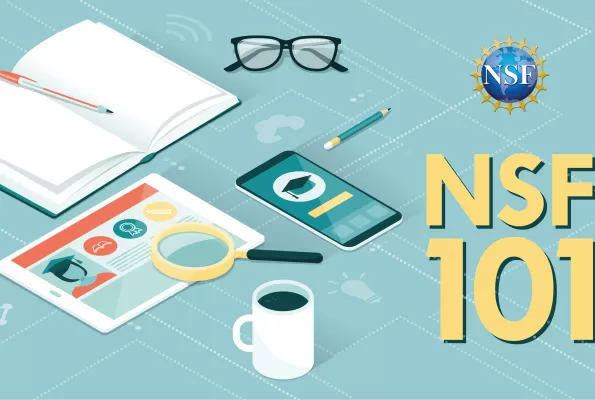
NSF 101: The Graduate Research Fellowship Program
Is graduate school in your future? Pursuing a PhD or master’s degree in science or engineering is an intellectual journey, opening doors to many career paths in academia, industry and beyond. The U.S. National Science Foundation can help fund your graduate education and kick-start your career. The Graduate Research Fellowship Program, or GRFP, is one of NSF’s oldest programs. Fellowships were first awarded in 1952 and predate NSF’s first awards for research grants.
GRFP is a prestigious program that supports outstanding graduate students pursuing research-based master’s and doctoral degrees in over 100 NSF-supported STEM fields. Every year, nearly 14,000 applications are received for about 2,000 fellowships. Fellowships comprise three years of financial support that can be used over a five-year period at accredited U.S. institutions, including an annual stipend of $34,000 and a cost-of-education allowance of $12,000 that graduate institutions agree to accept in lieu of charging tuition and fees.
Thousands of former GRFP fellows have gone on to become leaders in their chosen field, with several being honored as Nobel Laureates and members of the National Academies.
Here are five tips from a program officer to help you with your NSF Graduate Research Fellowship Program application :
1. Do your homework
One of the keys to your success is to read the entire program solicitation . It is a comprehensive list of instructions that will lay out exactly what you need to do to have a successful application. Make sure to read it twice!
If you have a research or academic mentor, have a conversation with them about your goals for your graduate training and subsequent career. This will help you organize ideas and formulate a strong narrative about your credentials and career goals in your application. Your mentor might also be willing to review drafts of your application or be able to connect you with a former Fellow for more advice.
2. Know your timelines
Each year the GRFP application portal opens between late July and early August. Application deadlines vary by discipline but generally fall in mid to late October of each year. GRFP regularly updates specific deadlines on its website . Writing a GRFP application is not a small task, but planning ahead can give you time and space to craft a competitive application and your references time to write their letters.
Y ou can apply during your undergraduate study or up to your second year in a graduate program. If you have already earned a master’s degree -- excluding one that you earned in a joint BS/MS program -- you may not be eligible to apply unless there has been a longer than two-year break in your graduate studies. If you are still unsure whether you are eligible, use the GRFP questionnaire .
3. Help references help you
In your GRFP application, you can submit names of up to five references. A minimum of three references are required, and two letters of recommendation must be received. Anyone can serve as a reference for your GRFP application, as long as they are not a family member. The best reference writers will be those who can provide detailed and specific information about your potential for success in graduate education and beyond.
Help your reference letter writers by giving them details about GRFP and why you are applying. Provide them with drafts of your personal statement and graduate research plan statements, along with your CV and other relevant materials. Remind them of big accomplishments that can provide some direction for crafting your letter.
4. Know your reviewers
Your GRFP application requires two statements: a Personal Statement that encompasses relevant background and future goals, and a Graduate Research Plan Statement; both should be written to reflect both intellectual merit and broader impact criteria.
Your Personal Statement is for reviewers to get to know you. How is your personal story different from other applicants? Describe any research experiences you may have that highlight your personal qualities. You can also detail challenges you overcame or significant contributions to science or society your work has made.
In your Graduate Research Plan statement, avoid being too focused on specifics or overly technical. Instead, focus on the rationale for your studies and how they fill a gap in the literature. GRFP reviewers are generally experts in your general field, but it is unlikely they will have deep knowledge of your specific proposed research topic.
5. It's all in the details
The program solicitation provides detailed instructions about the technical aspects of the application, like page limits and font sizes. Despite this, over 800 applications are returned to applicants each year due to formatting errors or missing documents. For example, the page length for the Personal Statement is three pages, and the Graduate Research Plan is two pages, including all references, citations, figures and other materials. Double check these details before starting, and again before submitting, to make sure your application is submitted without error.
Try to avoid submitting the application at the last second, especially if you are unfamiliar with the interface or might have unexpected internet connectivity issues. Certain formatting errors will be automatically rejected by the system, so submitting early will leave you extra time to make any required changes. The GRFP has created a video to help you navigate the technical processes of submitting your application.
NSF’s GRFP can be a transformative opportunity for young scientists and engineers to kick off their graduate training. If you have additional questions about the program, visit the GRFP website or email [email protected] . Good luck with your application!
About the Author
Related stories.
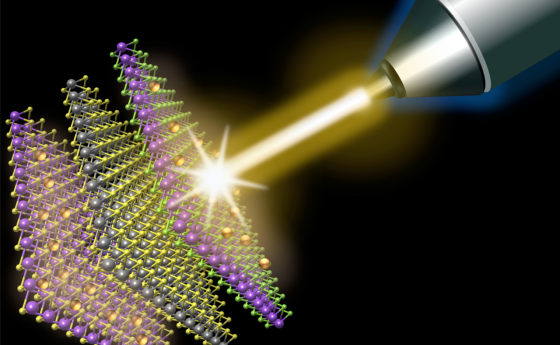
Concepts in quantum materials and computing: From dreams toward use
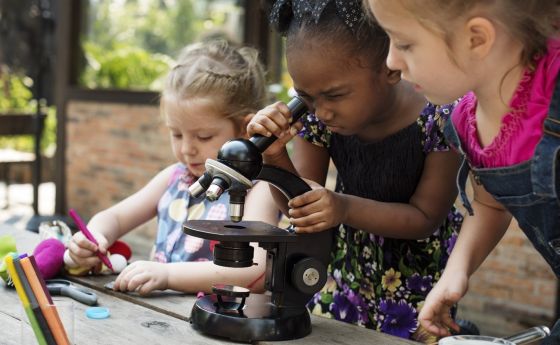
5 ways to make citizen science a year-round passion
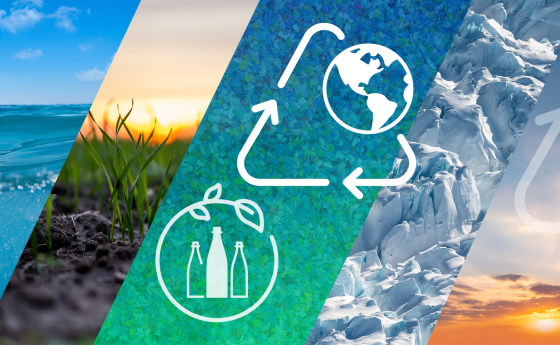
5 NSF projects transforming how researchers understand plastic waste
- Funding Opportunities Requiring Program Nomination or Institutional Endorsement
NSF Graduate Research Fellowship Program
The National Science Foundation’s (NSF) Graduate Research Fellowship Program (GRFP) provides three-year graduate research fellowships in science, mathematics and engineering, including Women in Engineering and Computer and Information Science awards. Fellowships are awarded for graduate study leading to research-based master’s or doctoral degrees in the mathematical, physical, biological, behavioral and social sciences; engineering; the history of science and the philosophy of science; and for research-based Ph.D. degrees in science education.
The NSF highly encourages minority students to apply. Fellowships are intended for individuals in the early stages of their graduate study at any appropriate, accredited, non-profit U.S. institution or appropriate international institution of higher education offering advanced degrees in science, mathematics, or engineering is considered eligible.
Fall 2023 Information Session
NSF GRFP Information Session Led by Professor William Hahn, this information session will provide a comprehensive overview of the GRFP and provide guidance on how to competitively frame the statements to meet the agency’s funding priorities. Date : TBA Location: Zoom
Writing for the GRFP
Students seeking assistance preparing proposals should reach out to Elizabeth George, Associate Director of Graduate Fellowships & Awards at [email protected].
Check back for writing workshop dates.
Special Sessions : Open-Writing with Individual Assistance from Writing Center Tutors The Writing Center offers appointments with tutors who are grant-writing specialists (designated in the tutor’s bio which pops up when you schedule an appointment); you can also sign up for any other open slot, since all tutors should be prepared to help with both your personal statement and your research statement. Follow the below link to setup an account and schedule an appointment: http://writingcenter.georgetown.edu/
- Three (3) years of stipend, currently $37,000 per year, disbursed over a five-year period while student is on “active” tenure.
- $16,000 cost-of-education allowance to the home institution per year of “active” tenure.
- Opportunities for international research through GROW and federal internships through GRIP
- Supercomputing resources through XSEDE
Student Eligibility
- U.S. citizens, nationals, or permanent residents.
- Undergraduate seniors and bachelor’s degree holders may apply before enrolling in a degree-granting graduate program.
- Graduate students enrolled in a degree-granting graduate program are limited to only one application to the GRFP, submitted in the first year or at the beginning of the second year of their degree program.
- Individuals pursuing a master’s degree simultaneously with the bachelor’s degree (joint bachelor’s-master’s degree) must have completed three (3) years in the joint program and are limited to one application to GRFP; they will not be eligible to apply again as a doctoral degree student.
- Individuals holding joint bachelor’s-master’s degrees currently enrolled as first-year doctoral students, who have not previously applied as graduate students and enrolled in the doctoral program the semester following award of the joint degree, may apply as first-year doctoral students only.
- There is a limited opportunity for returning graduate students to apply for a graduate research fellowship. Individuals who have (i) completed more than one academic year in a degree-granting program, (ii) earned a previous master’s degree of any kind (including bachelor’s-master’s degree), or (iii) earned a professional degree (e.g., law, medicine) are eligible only if: 1) they have had a continuous interruption in graduate study of at least two consecutive years immediately prior to the application deadline; and 2) are not enrolled in a degree-granting graduate program at the application deadline.
- Applications withdrawn by November 15 of the application year do not count toward the one-time graduate application limit. Applications withdrawn after November 15 count toward this one-time limit.
- Applications not reviewed by NSF (returned without review) do not count toward the one-time graduate application limit
- Fellowships cannot be held or combined concurrently with other federal or government-funded fellowships (e.g., Boren, Fulbright, Fulbright-Hays, SMART, etc.)
Eligible Fields of Study
- Computer & Information Science & Engineering
Engineering
- Geosciences
Life Sciences
- Materials Research
- Mathematical Sciences
- Physics & Astronomy
- Psychology – except clinical or counseling
- Social Sciences
- STEM Education & Learning Research
- Other: see full list of fields in the Appendix of the 2024 program solicitation
Ineligible Fields of Study
- M.D./Ph.D., J.D./Ph.D. and other joint professional degree-science programs
- Medical, dental, law, and public health programs
- MBA, MPH, MSW, J.D., M.D., DDS and other practice-oriented professional degree programs
- bioengineering research with diagnosis or treatment specific goals which apply engineering principles to problems in biology and medicine;
- bioengineering research to aid persons with disabilities
- Other ineligible fields of study: consult Appendix of the 2024 program solicitation
Application Information
- Official NSF 2024 program solicitation
- Research.gov: Application and Help Desk
- NSFGRF Operations Center web site for guidance and general inquiries
Application Materials & Evaluation The Research.gov application consists of the following:
- Personal, Relevant Background, and Future Goals Statement (3-page maximum)*
- Graduate Research Statement (2-page maximum)*
- Undergraduate and Graduate (if applicable) Transcripts
- Three (3) Letters of Reference (uploaded separately to research.gov by selected referees)
*Applications, and specifically the two statements , will be evaluated according to the NSF’s stated “Broader Impacts” and “Intellectual Merit” criteria . Familiarity with these criteria is strongly encouraged. Applicants are advised to read the 2024 program solicitation and to attend the information sessions and the grant-writing workshop series scheduled for August and again in September/October 2023. Early consultation with advisors, letter writers, and Elizabeth George (Coordinating Official), and review of the below Applicant Resources strongly advised.
The application must be submitted in Research.gov no later than 5:00 p.m. local time, as determined by applicant’s mailing address.
Application Deadlines :
October 16, 2023
October 17, 2023
Computer and Information Science and Engineering, Materials Research, Psychology, Social Sciences, STEM Education and Learning
October 19, 2023
October 20, 2023
Chemistry, Geosciences, Mathematical Sciences, Physics and Astronomy
Applicant Resources
Resources Provided by the Graduate School
- NSF GRFP Information Session: Program Overview — Prof. William Hahn, September 2020
Resources Provided or Endorsed by the NSF
- NSFGRFP.org , the application processing center, is a great resource for applicants and referees
- Video : Applying to the NSF GRFP – NSF Graduate Research Fellowship Program
Resources Provided by Other Institutions or Former Fellows
- Video: Applying to the NSF GRF Program (2020) – Provided by NSF GRF Program Directors — forthcoming!
- NSF-GRFP Insights: Application Resources for the NSF Graduate Research Fellowship Program – courtesy of Dr. Robin Walker and the University of Missouri
- NSF Graduate Research Fellowship Program – Neale Fox
- Advice for Applying for Graduate Science Fellowships – Philip Guo
- Advice for NSF-GRF Applications – Mallory P. Ladd
- Helping Students to Tell Their Stories – James M. Lang
- Leave Dr. Seuss Out of It – Female Science Professor
- How to Win a Graduate Fellowship – Michael Kiparsky
- Where Storytelling Meets Science – Lesley McCollum and Michelle Lavery
- Video : 5 Tips for Writing a Winning NSF GRF Proposal – by Ritu Raman
- NSF Graduate Research Fellowship – Alex Hunter Lang
“Breaking News” & Other Live Guidance on Social Media
- NSF GRFP on Facebook
- NSF GRFP on LinkedIn
- NSF GRFP on Twitter
Questions?
Please contact Elizabeth George ([email protected]), Georgetown’s NSF GRF Coordinating Official.
Current Fellows
- DACA/Undocumented
- First Generation, Low Income
- International Students
- Students of Color
- Students with disabilities
- Undergraduate Students
- Master’s Students
- PhD Students
- Faculty/Staff
- Family/Supporters
- Career Fairs
- Post Jobs, Internships, Fellowships
- Build your Brand at MIT
- Recruiting Guidelines and Resources
- Connect with Us
- Career Advising
- Distinguished Fellowships
- Employer Relations
- Graduate Student Professional Development
- Prehealth Advising
- Student Leadership Opportunities
- Academia & Education
- Architecture, Planning, & Design
- Arts, Communications, & Media
- Business, Finance, & Fintech
- Computing & Computer Technology
- Data Science
- Energy, Environment, & Sustainability
- Life Sciences, Biotech, & Pharma
- Manufacturing & Transportation
- Health & Medical Professions
- Social Impact, Policy, & Law
- Getting Started & Handshake 101
- Exploring careers
- Networking & Informational Interviews
- Connecting with employers
- Resumes, cover letters, portfolios, & CVs
- Finding a Job or Internship
- Post-Graduate and Summer Outcomes
- Professional Development Competencies
- Preparing for Graduate & Professional Schools
- Preparing for Medical / Health Profession Schools
- Interviewing
- New jobs & career transitions
- Career Prep and Development Programs
- Employer Events
- Outside Events for Career and Professional Development
- Events Calendar
- Career Services Workshop Requests
- Early Career Advisory Board
- Peer Career Advisors
- Student Staff
- Mission, Vision, Values and Diversity Commitments
- News and Reports
Learn about the NSF Graduate Research Fellowship Program (GRFP)
- Share This: Share Learn about the NSF Graduate Research Fellowship Program (GRFP) on Facebook Share Learn about the NSF Graduate Research Fellowship Program (GRFP) on LinkedIn Share Learn about the NSF Graduate Research Fellowship Program (GRFP) on X
Reminder to current NSF Fellows : Sign into your NSF GRFP portal and declare your status for the upcoming academic year before April 28, 2023
Interested in learning more about the Fellowship Program? Register for and attend the following upcoming webinar:
We will be hosting a presentation on Tuesday, April 25, 2023 at 11am providing an overview of the NSF GRFP at MIT! Sign up below. This presentation is great for any of the following:
- Students recently awarded an NSF GRFP Fellowship
- Students currently holding an NSF GRFP Fellowship
- Recently admitted/first-year students interested in learning more about this program
- Faculty/Staff looking to become more familiar with the program, its policies and funding structure
If you are interested in attending, please sign up here ! You will receive an official Zoom invitation one week in advance prior to the presentation, so please mark the date and time on your calendar in the meantime.

APPLICATION PREPARATION:
ONLY COMPLETE APPLICATIONS WILL BE ACCEPTED. INCOMPLETE APPLICATIONS WILL NOT BE REVIEWED .
NSF Announces 2023 Graduate Research Fellowship Program (GRFP) Awardees
Seven ccs students awarded distinguished fellowship.
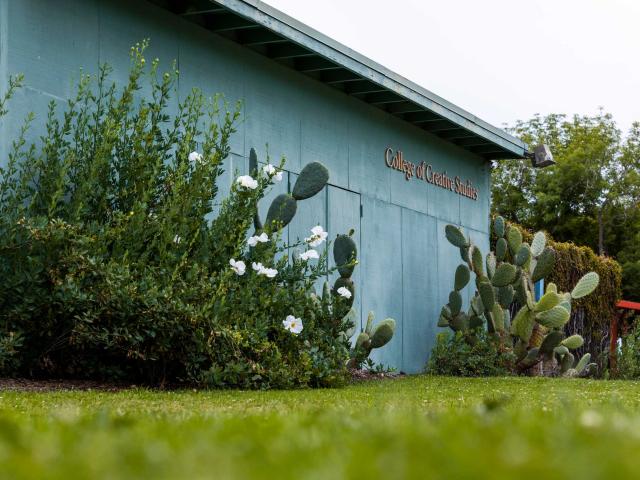
The National Science Foundation (NSF) has announced the 2023 Graduate Research Fellowship Program (GRFP) awardees. Seven recipients of this award are or were CCS undergraduates. The College extends its congratulations to all of the CCS and other UCSB recipients with wishes for much success as they embark on their future endeavors as experts in their fields, contributing to the well-being of society at large.
“Our CCS students are working hard every day to find new ways to create knowledge and understanding in the world and we have so much to be proud of their accomplishments––including these 7 awardees––who will have an unique and prestigious opportunity to continue their creativity into graduate school through the support of the National Science Foundation.” —Timothy Sherwood, CCS Interim Dean
The CCS students include:
—Sam Alcott ‘23 (CCS Physics) (Will pursue a Ph.D. in Physics at University of California, Berkeley).
—Marianne Arriola ‘23 (CCS Computing) (Will pursue a Ph.D. in Computer Science at Cornell University)
—Pieter Derksen ‘20 (CCS Physics) (Currently pursuing a Ph.D. in Physics at University of California, Santa Barbara)
—Samuel F. Gebretsadkan ‘ 23 (CCS Physics) (Will pursue a Ph.D. in Physics at Harvard University)
—Logan Gonzalez ‘20 (CCS Biochemistry) (Currently a microbiologist at The Engineer Research and Development Center’s Cold Regions Research and Engineering Laboratory (CRREL) in Hanover, New Hampshire)
—Chloe Jenniches ‘23 (CCS Biology) (Will pursue a Ph.D. in Marine Biology at Scripps Institution of Oceanography at University of California, San Diego)
—Ryan Judy ‘22 (CCS Biology) (Currently a research assistant at the Medical Research Council’s Laboratory of Molecular Biology in Cambridge, England. Will not accept NSF GRFP as he will be pursuing a Ph.D. in the United Kingdom.)
CCS also extends warm congratulations to those who received Honorable Mention:
—Sean Benevedes ‘21 (CCS Physics)
CCS faculty offer dedicated mentorship and advice to our curious and passionate undergraduate students of whom approximately 70 percent pursue master’s and doctoral degrees, identified from an alumni survey several years ago. The College acknowledges the efforts by CCS Biology Faculty John Latto and Claudia Tyler who teach a colloquium at CCS, open to any students in all 8 majors, focused on applying to graduate school and covers the GRFP. Past CCS GRFP recipients, including those who have participated in the CCS colloquium in past years, have returned to CCS to speak at this colloquium to current students, possible GRFP future applicants.
This prestigious graduate fellowship program supports outstanding graduating seniors and beginning graduate students in NSF-supported science, technology, engineering, and mathematics disciplines who are pursuing research-based master’s and doctoral degrees at accredited United States institutions of higher education. GRFP is the oldest graduate fellowship of its kind and has a tradition of selecting recipients who achieve high levels of success in their future academic and professional careers.
Fellows benefit from a three-year annual annual stipend along with a cost of education allowance for tuition and fees, opportunities for international research and professional development, and the freedom to conduct their own research at any accredited U.S. institution that offers graduate education. These NSF Fellows are anticipated to become knowledge experts who can contribute significantly to research, teaching, and innovations in science and engineering.
28 Vanderbilt students named 2023 NSF Graduate Research Fellows
Media inquiries.
- 615-322-6397 Email
Latest Stories
- Class of 2024 celebrated as extraordinary overcomers at Vanderbilt’s Commencement
- Chancellor Daniel Diermeier’s 2024 Commencement Address
- Vanderbilt University honors emeritus and emerita faculty, one emeritus dean
Jun 13, 2023, 4:34 PM
The National Science Foundation has selected 28 Vanderbilt students for its 2023 Graduate Research Fellowship Program .
The NSF GRFP supports outstanding graduate students who are pursuing research-based master’s and doctoral degrees at accredited U.S. institutions in science, technology, engineering, mathematics, STEM education and NSF-backed social science disciplines.
Fellows receive a three-year annual stipend of $37,000 along with a $12,000 cost-of-education allowance for tuition and fees, as well as access to opportunities for professional development available to NSF-supported graduate students.
Vanderbilt’s 2023 NSF GRFP scholars
Additionally, five Vanderbilt students received an honorable mention designation for the program.
Vanderbilt’s 2023 NSF GRFP honorable mentions
Since 1952, NSF has funded over 60,000 Graduate Research Fellowships out of more than 500,000 applicants. The application for 2024 Graduate Research Fellowships opens in July 2023.
Those interested in the NSF Graduate Research Fellowship Program or other competitive fellowships should contact Elizabeth Harrington Lambert , associate director of fellowships and scholarships at Vanderbilt.
About the Career Center
The Career Center supports all undergraduate students, graduate students (STEM, humanities and social science disciplines), postdoctoral fellows and Vanderbilt alumni up to two years after graduation.
About the Fellowships Team
The Fellowships Team supports all Vanderbilt students, postdoctoral fellows and alumni who are eligible to apply for awards that require institutional nomination. More information about supported fellowships can be found on the Career Center website .
Explore Story Topics
- Education and Psychology
- Engineering and Technology
- Life, Earth and Space
- Arts and Science
- Arts and Science Research
- engineering
- featured research
- Mathematics
- national science foundation
- NSF Graduate Research Fellowship
- student awards

An official website of the United States government, Department of Justice.
Here's how you know
Official websites use .gov A .gov website belongs to an official government organization in the United States.
Secure .gov websites use HTTPS A lock ( Lock A locked padlock ) or https:// means you’ve safely connected to the .gov website. Share sensitive information only on official, secure websites.
NIJ FY23 Graduate Research Fellowship
Download PDF, 871.35 KB
The Graduate Research Fellowship (GRF) program provides grants to accredited academic institutions to support outstanding doctoral students whose dissertation research is relevant to criminal and or juvenile justice. Applicant academic institutions are eligible to apply only if:
- The student is currently enrolled in a Ph.D. program in the sciences or engineering.
- The student’s proposed dissertation research has demonstrable relevance to preventing and controlling crime, and/or ensuring the fair and impartial administration of criminal and/or juvenile justice, in the United States.
Number of Awards: 24 Total Amount Awarded: $2,624,800
A multilevel analysis of juvenile life without parole and its reform: understanding the people, places, and politics that shape policy.
Assessing solvability factors in missing person cases: a mixed-method approach, audio deepfake detection for forensics and security, beyond suspect identification: fingerprint aging with machine learning and multidimensional chemical analysis, california: a decade of decarceration, cannabis liberalization policies and trends in cannabis-related school-based discipline: examining sociodemographic disparities in massachusetts, development of a stable matrix-matched standard for molecular and elemental analysis of hair in forensic toxicology, development of computational methods for genetic identification and kinship analysis of forensic samples, evaluation of cell capture and collection from bone, extreme risk protection orders in washington state and their impact on firearm-related arrests and convictions, losing sleep and losing control: the impact of subjective and objective sleep on the problem behavior and mental health of justice-involved young adults, mental health in the criminal justice system-the effect of mandating treatment for convicted individuals, military sexual trauma experiences of female veterans in michigan, next generation emergency networks, ontogenetic study of the pelvis through examination of interlandmark distances and geometric morphometric analyses: implications for subadult sex and age estimation, operationalizing the individual versus group fairness dichotomy for recidivism risk assessment: us legal challenges and technical proposals, pretrial policy change and place: evaluating the impacts of maryland's bail reform on crime and pretrial outcomes across courts, prisoners on the move: examining the nature and effects of prison transiency on incarcerated individuals, regulating data bias in intelligent decision making, sampling and selection bias in research using documented skeletal collections, the mortal tragedy: analyzing body disposal patterns in homicide cases, thrive: transformative health and reproductive information for incarcerated women's empowerment., thriving, not surviving: refocusing juvenile justice assessments and strategies, we met them where they are, but is it enough a qualitative examination of a co-response outreach program servicing vulnerable populations in philadelphia, similar opportunities.
- NIJ FY24 Research on Multidisciplinary Teams
- NIJ FY24 Research and Evaluation on School Safety
- NIJ FY24 Research on the Abuse, Neglect, and Financial Exploitation of Older Adults
14 Highlanders receive 2023 NSF Graduate Research Fellowships
The National Science Foundation Graduate Research Fellowship Program , or NSF GRFP, announced its 2023 cohort and it includes 14 awardees and three honorable mentions who are current UCR undergraduates, graduates, or alumni.
NSF GRFP supports a diverse selection of graduate students pursuing a full-time, research-based master’s and doctoral degree in science, technology, engineering, and mathematics, or STEM, at an accredited U.S. institution.
This competitive award has a 16% acceptance rate and candidates must demonstrate the potential to be high-achieving scientists and engineers. Fellows are anticipated to become experts who contribute significantly to research, teaching, and innovations in STEM to maintain and advance the nation’s technological infrastructure and national security, as well as contribute to the economic well-being of society.
The five-year fellowship provides awardees with a total of $147,000 to support their graduate studies, which includes a cost-of-education allowance and stipend.
Since the NSF GRFP’s establishment in 1952, 42 Fellows have gone on to become Nobel laureates and more than 450 have become members of the National Academy of Sciences. The program has a high rate of doctorate degree completion, with more than 70% of fellows completing their doctorate within 11 years.
Since the 2013 establishment of UCR's Undergraduate Education Prestigious Scholarships & Awards Office , there have been 61 NSF GRFP awarded Highlanders and 18 honorable mentions.
NSF GRFP is open to fourth-year undergrads who will pursue graduate school and current graduate students. To learn more about the application process and deadlines, visit engage.ucr.edu or nsfgrfp.org .
Highlander Awardees of 2023 NSF GRFP
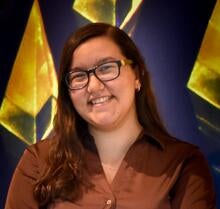
Kimberly Rose Bennett
Received a B.S. in bioengineering w/ honors from UCR in 2021 and is a second-year Ph.D. candidate at Harvard-MIT Health Sciences and Technology.
Other awards: MIT-Sloan UCEM Scholar, Tau Beta Pi Fellow, Ford Foundation Predoctoral Fellow, and NSF GRFP Fellow.
As a first-generation college student and first-generation Mexican-American, Bennett is passionate about uplifting other first-generation and historically-excluded minority students into graduate programs and improving their representation in academia. Bennett's current research focuses on developing new nanocarriers to treat pediatric brain tumors and utilizes microfluidic devices to model blood-brain barrier vasculature in vitro.
“Shock, pride, disbelief, grateful — all these words cannot fully describe how I feel receiving the NSF GRFP as someone from a first-generation background who didn't understand what research or graduate school were until later in my academic career and has constantly felt "behind" when compared to peers. This accomplishment would not have been possible without Dr. Victor Rodgers. I still remember how nervous I was sitting in his office and asking to join his lab. I am eternally grateful to him and Dr. Byron Ford for both being incredible co-mentors, pushing me to become a confident researcher, convincing me to pursue a Ph.D., and supporting me every step of the way. This is truly their award. The value of such exceptional mentors has been immeasurable, and I look forward to being that "difference" to others' academic journeys, just as they have been to mine." - Bennett
Vincent Chávez
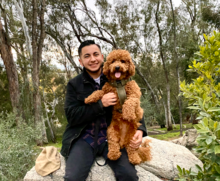
Pursuing a B.A. in psychology, expected to graduate from UCR in spring 2023, and will pursue a Ph.D. in psychology at UC Davis.
Other awards: 2022-2023 Chancellor’s Research Fellow and 2022 Undergraduate Research Mini-Grant Recipient
This former community college basketball player credits a psychology research project highlighting the academic strengths of athletes as his inspiration to pursue research to invalidate myths and validate theories. Chávez is a first-generation transfer student who conducts research with Dr. Tuppett M. Yates in the Adversity and Adaptation Lab. His research examines adolescents’ physiological and behavioral regulatory responses using a laboratory task designed to evoke a startle and its implications for later health outcomes and social adjustments.
“I am so thankful and thrilled to have received the NSF GRFP award this year! It's an honor to be recognized as a distinguished fellow at the national level for your hard work and dedication to your field of study. I consider myself very fortunate to have had a dream team of UCR officials and faculty supporting me through the rigorous NSF application process. I want to give a huge recognition to my CRF faculty mentor Dr. Tuppett M. Yates, for always being in my corner since day one and for pushing me to strive for excellence! I’m excited to study self-regulation and cardiac health among youth as I pursue my Ph.D. in Psychology at UC Davis with Dr. Paul D. Hastings starting this fall 2023.” - Chávez

Hannah Hapich
Received a B.S. in environmental sciences from UCR in 2022 and is expected to complete a Ph.D. in environmental sciences at UCR in 2027.
Other awards: 2020-21 Chancellor’s Research Fellow and 2021-22 Senior Chancellor’s Research Fellow
Growing up in Pennsylvania, Hapich was inspired to focus on environmental issues because of fracking in her hometown. As a UCR undergrad, she spent a summer conducting environmental research with a nonprofit organization in Varanasi, India.
“I am so honored to have received the NSF GRFP and look forward to studying microplastic and tire particle transport throughout Southern California. I have learned so much through the application process and am so grateful for my amazing mentors and support system that have helped me get here.” - Hapich
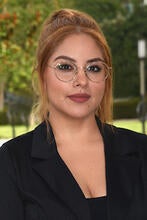
Diana Lopez
Received a B.S. in chemistry from UCR in 2021 and is expected to complete a Ph.D. in chemistry at UC Irvine.
Other awards: CAMP Scholar Award, Neil Allison Campbell Endowed Research Award, and Ph.D. Science Fellowship through the National GEM Consortium
Diana's journey to where she is today has been far from conventional. Following high school, she worked as a medical assistant in healthcare to provide financial support for her family. During that time, her fascination with medical implants and their scientific foundations grew, as she became increasingly aware of how they can significantly improve the quality of life for patients. This piqued Diana's interest in studying the fundamental science of implants, leading her to enroll in community college where she eventually met the transfer requirements for UCR.
"I believe that everyone should have the opportunity to discover their passion for science and pursue a fulfilling career in the field if they so choose. The fellowship has been instrumental in supporting my efforts to investigate the underlying chemistry of one-dimensional ‘van der Waals materials.’ Due to their distinct electronic and optical properties, these [special] materials hold great promise for use in the development of advanced electronic and optoelectronic devices." - Lopez
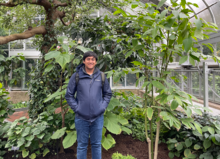
Advyth Ramachandran
Pursuing a B.S. in biology, expected to graduate from UCR in spring 2023, and hoping to pursue a Ph.D. in ecology at the University of Colorado, Boulder.
SEEDS, Ramachandran reinvigorated the program and increased membership by organizing a research project, data analysis workshops, field trips, and socials; and facilitating peer-to-peer networking, research opportunities, and professional development. As president of the UCR Natural History Museum Club, he organized multidisciplinary training opportunities in museum curation and natural history; and organized weekly curatorial activities, collection tours, and a social to connect students with faculty and research opportunities at UCR. Ramachandran conducts research with UCR’s Dr. Marko Spasojevic.
"I am honored to receive the NSF GRFP and I am immensely grateful to all of my mentors and instructors at UCR whose guidance and teaching prepared me to apply for this fellowship. I am very excited to study plant community dynamics as I pursue my Ph.D. in ecology at the University of Colorado, Boulder." - Ramachandran
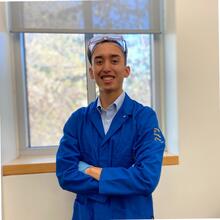
Ricardo Tolentino
Graduated from UCR in 2021 with a B.S. in chemistry and is currently pursuing a Ph.D. in chemistry at Caltech.
As an undergrad at UCR, Tolentino worked with the Raincross Boxing Academy, serving as a mentor to underserved youth, and acted as a Student Engagement/Prestigious Scholarship Ambassador promoting undergrad research. With his help, UCR's Student Engagement launched an online mentorship program during the pandemic. Tolentino is currently working on entangled photon spectroscopy with the Cushing Lab at Caltech.
"I am honored to receive the NSF GRFP and I am extremely grateful for my mentors and experiences at UC Riverside that allowed me (to be) on this path." - Tolentino
Full list of Highlanders awarded the 2023 NSF GRFP: Kimberly Rose Bennett, Douglas E. Castro, Vincent Alejandro Chávez, Cheyenne R. Darrow, Kathryn Elizabeth Hammar, Hannah Rose Hapich, Celeste N. Hofstetter, Diana Lopez, Michael Austin Lum, Isaac Menchaca, Eva Ottum, Advyth Ramachandran, Ricardo Pfleider Tolentino, and Alfredo J. Velasquez; Honorable mentions: Lida Halilovic, Omar Y. O'Mari, and Megan A. Woods
Related Awards
Doctoral student brenda lopez awarded uc president’s postdoctoral fellowship, fulbright awards will fund students’ research in hungary and vietnam, graduate division recognizes outstanding students, postdocs, and faculty, ucr chef wins gold medal in cooking challenge.
You are using an outdated browser. Please upgrade your browser to improve your experience. Thanks!

- Fellowship Advising
- Start Your Funding Search
- Awards We Advise On For Undergrads
- Awards We Advise On For Grad Students and Postdocs
- Wall of Honor
- Workshops and Information Sessions
- Asking For Recommendations
- Principles of Grant Writing
NSF Graduate Research Fellowship Program
NSF GRFP Application Accelerator Summer Program:
Each summer, Stony Brook offers an Application Accelerator program that walks participants through the strategies and guidance on developing a strong application for NSF GRFP from experienced faculty and staff. This program is open to all SBU applicants eligible to apply for the October 2024 deadline, including our new incoming grad students.
Sign up for NSF GRFP Advising!
Contact: [email protected]
2024 NSF Graduate Research Fellowship Recipients and Honorable Mentions
The awardees and honorable mentions for the 2024 NSF Graduate Research Fellowship Program (GRFP) competition were recently posted and several Biology students were recognized. MCBB PhD student Kristen Harder of the McCall Lab , Biology PhD student Dylan Mankel of the Marlow Lab , and Biology PhD student Elif Ozsen of the Chantranupong Lab were awarded with 3-year graduate research fellowships. Biology PhD students Catherine Gill of the Gilmore Lab and Victoria Guarino and Yu (Emily) Yang of the Wunderlich Lab received honorable mentions.
Congratulations to the awardees and honorable mentions on your hard work and this well-deserved honor.


Three Earn National Science Foundation Graduate Research Fellowships
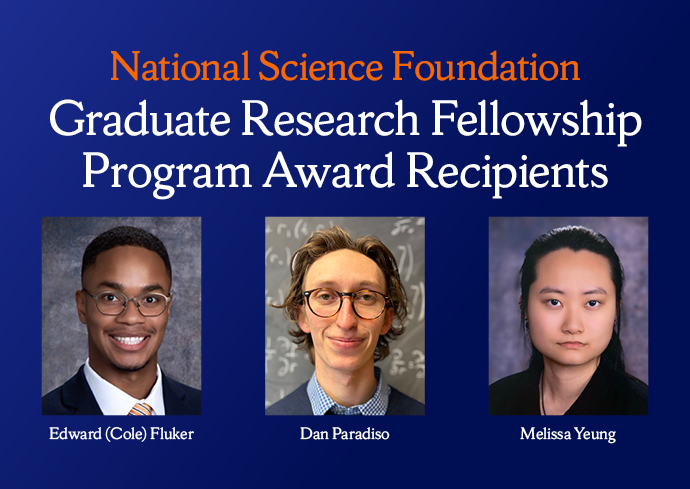
Three Syracuse University students have been awarded prestigious graduate research fellowships through the National Science Foundation (NSF) Graduate Research Fellowship Program (GRFP), and two students have been recognized with honorable mentions.
The fellowship recognizes and supports outstanding graduate students who are pursuing research-based master’s and doctoral degrees in the U.S. The five-year fellowship includes three years of financial support, including an annual stipend of $37,000 and a $16,000 educational allowance.
The 2024 recipients of the NSF GRFP are the following:
- Edward (Cole) Fluker, a senior chemical engineering major in the College of Engineering and Computer Science (ECS). Fluker will be joining the Ph.D. program in chemical and biomolecular engineering at the University of Pennsylvania upon graduation.
- Dan Paradiso, a second-year Ph.D. student in physics in the College of Arts and Sciences.
- Melissa Yeung, a first-year Ph.D. student in mechanical and aerospace engineering in ECS.
Edward (Cole) Fluker
Fluker, who was recently named a University Scholar, initially got involved in research in his sophomore year and took on his first significant research project the following summer. Through the University’s Louis Stokes Alliance for Minority Participation (LSAMP) Research Experience for Undergraduates (REU) program, he worked under Ian Hosein, associate professor of biomedical and chemical engineering, analyzing a gel polymer electrolyte system as an alternative to liquid electrolytes in calcium-ion batteries. The research resulted in a paper, on which Fluker was first author, in the American Chemical Society’s Journal of Physical Chemistry.
That experience led him to pursue more research opportunities in energy storage. In summer 2023, he completed the Internet of Things for Precision Agriculture REU at the University of Pennsylvania, where he studied the power and energy performance of aluminum air batteries (AABs) with Ag-based cathodes.
“By the end of the project, I had successfully fabricated cathodes that resulted in power performance of 70% of the commercial option at less than 1/4,000th of the cost,” Fluker says. “I was especially interested in creative efforts to improve efficient agricultural practices, and I hope to continue contributing to them while at UPenn.”
Fluker says the NSF GRFP will give him financial resources to help broaden his research to be more sustainable and inclusive. “There is a severe underrepresentation of Black students pursuing advanced degrees, and I believe this program will help me launch a pipeline program for African American students to support their advanced degree aspirations,” he says. “On top of my research goals committed to next generation energy storage, I want to pave a path for underrepresented students that opens doors they never thought were meant for them.”
Dan Paradiso
Paradiso’s research is focused on the deaths of massive stars in the universe, known as core-collapse supernovae. These stars, which have masses of around 10 to 100 times the mass of the sun, end their life in a cataclysmic and explosive death that produces light that can be detected with ground and space-based telescopes. Decades of research, however, suggests that not all stars that undergo core-collapse result in a successful explosion and instead the star can continue to implode until a black hole is formed. These events are referred to as failed supernovae, and it is estimated that approximately 20-30% of stars that undergo core-collapse result in a failed supernova.
“In my research I focus on the dynamics of shockwaves, which are ubiquitous with core-collapse supernova physics, using analytical and numerical methods to understand these failed supernova explosions,” Paradiso says. “I then use these techniques to make predictions about observable properties of failed and sub-energetic explosions.”
“As a second-year graduate student, the generous support from the GRFP is very welcome, and I am excited to continue my research with this support,” he says.
Melissa Yeung
Yeung works in the fluid dynamics lab of Yiyang Sun, assistant professor of mechanical and aerospace engineering, where she focuses on supersonic jet engines.
High noise levels have always been associated with supersonic aircraft, restricting their flight range to over sea. “The goal of my work is to alleviate the undesired features through strategically placed small micro-jets of air. I am currently focused on optimizing these micro-jets such that they can continuously modulate themselves to adapt to various flight conditions. By doing so, the flow can be controlled even in off-design conditions and with minimal energy input,” Yeung says. “Understanding these complex flow physics is vital for the development of next-generation high-performance aircraft. Successfully controlling this flow can improve upon the aircraft’s performance and ensure the safety of nearby workers or civilians. This work is one of many steps in pushing supersonic flight for commercial use.”
Yeung says the GRFP fellowship will allow her more flexibility in her research direction, fund her research activities and allow her to attend more conferences.
Yeung also notes the tremendous amount of support she received from Sun, Professor Emeritus Mark Glauser and Gina Lee-Glauser, retired vice president for research, throughout the application process. “Their guidance has been crucial to my success and without them I would have not have the honor of being an NSF GRFP recipient, she says.
Nicholas Rubino and Elizabeth Su
Two students also received honorable mentions in this year’s NSF GRFP competition. Nicholas Rubino, a second-year Ph.D. student in mechanical and aerospace engineering in ECS who is researching robotic devices for physical rehabilitation, and Elizabeth Su, a senior graduating with a bachelor’s degree in bioengineering and neuroscience from the College of Arts and Sciences. Su will pursue a Ph.D. in biomedical engineering at Purdue University, researching enhanced visual prosthetics.
The CFSA will hold an NSF GRFP virtual writing bootcamp the week of June 10-14. The bootcamp is for rising seniors and first- and second-year graduate students who are eligible for and plan to apply for the NSF GRFP this fall.
Students interested in learning more about or applying for the next NSF GRFP award cycle or any other nationally competitive scholarships and fellowships should visit the CFSA website or email [email protected] for more information.
Kelly Rodoski
- Sei Whale Death Sparks Conversations About Ecology, Marine Safety Friday, May 10, 2024, By Daryl Lovell
- 5 Questions for Commencement Speaker Dario Nardella, Mayor of Florence, Italy Thursday, May 9, 2024, By News Staff
- Commencement 2024 by the Numbers Thursday, May 9, 2024, By Christine Grabowski
- In Memoriam: Life Trustee Michael ‘Mike’ Falcone ’57 Thursday, May 9, 2024, By Eileen Korey
- In Memoriam: Life Trustee Bernard ‘Bernie’ Kossar ’53, L’55 Thursday, May 9, 2024, By Eileen Korey
More In STEM
Breaking into male-dominated fields: how 3 talented students are blazing a trail.
Women have traditionally found themselves outnumbered by their male counterparts when it comes to jobs in science, technology, engineering and math (STEM) fields, as only 21% of engineering majors and 19% of computer and information science majors are women, according…
Professor Qinru Qiu Named Distinguished Professor
Electrical engineering and computer science (EECS) Professor Qinru Qiu has been named a distinguished professor by the College of Engineering and Computer Science (ECS). Qiu previously received the Association for Computing Machinery (ACM) SIGDA Distinguished Service Award and the National…
Undergraduate Spearheads Study Using Physics to Understand How Cells Self-Sort
Erin McCarthy ’23, physics summa cum laude, is a rarity among young scientists. As an undergraduate researcher in the College of Arts and Sciences’ Department of Physics, she guided a study that appeared in March 2024 in Physical Review Letters….
Professor Receives NSF CAREER Award to Research Context Sensitive Fuzzing for Networked Systems
Despite advances in cybersecurity, even the most protected networks are vulnerable to cyberattacks due to software bugs or security flaws. Though vulnerability detection methods such as fuzzing can detect bugs, these methods have some limitations. Endadul Hoque, assistant professor in…
National Science Foundation Funds Physics Internship Program for Syracuse High School Students
A University initiative that aims to provide Syracuse-area high school students with experience in emerging technologies has been awarded nearly $1 million from the National Science Foundation (NSF) through the Experiential Learning for Emerging and Novel Technologies (ExLENT) program. The…
Subscribe to SU Today
If you need help with your subscription, contact [email protected] .
Connect With Us
For the media.
- The Graduate School >
- Graduate News >
Four from UB receive NSF Graduate Research Fellowship
By Charles Anzalone
Release Date: May 7, 2024
BUFFALO, N.Y. – Three University at Buffalo students and one alumna have received prestigious National Science Foundation (NSF) Graduate Research Fellowship Program (GRFP) scholarships.
Two alumni and one current students received honorable mentions.
The latest awards continue UB’s success in placing its students as winners in the GRFP scholarship program. Launched in 1952, the GRFP represents the oldest continuous investment in the nation’s science, technology, engineering and mathematics (STEM) workforce. As one of the most competitive scholastic programs in the U.S., it recruits high-potential, early-career scientists and engineers, and supports their graduate research training.
“The NSF Graduate Research Fellowship is a great recognition of the recipients’ accomplishments,” says Ashlee N. Ford Versypt, associate professor in the Department of Chemical and Biological Engineering, and faculty fellow for NSF GRFP at UB. “Their potential for further impacts in their fields of research is a reflection of the outstanding research environment at UB.
“Additionally, Ariel Lighty, one of this year’s recipients, is a graduate student in my lab, which is very exciting personally.”
The UB students and recent graduates who received the GRFP are:

Lauren Heinzinger (Scarsdale, New York)
Heinzinger graduated from UB in 2021 with a BS in biological sciences and a BA in English and psychology. While at UB, she was a National Institutes of Health Undergraduate Scholarship Program (NIH UGSP) recipient and a Ronald E. McNair Scholar. After earning her bachelor’s degree, she worked at the NIH as a postbaccalaureate research fellow for two and a half years. In the fall, she will pursue a PhD in microbiology and immunology at the University of Michigan as a Rackham Merit Fellow. Heinzinger’s basic and translational research interests include host-pathogen interactions and bacterial pathogenesis.

Luke Hess (Grand Island, New York)
Hess graduates from UB this spring with a BS in biochemistry and will pursue a PhD in cancer biology at the University of Michigan. He conducted research in biochemistry professor Jennifer Surtees’s lab at UB and at Roswell Park Comprehensive Cancer Center under Katerina Gurova. His research pertains to understanding genomic instability and characterizing next-generation chemotherapies, called chromatin damaging agents. Hess has also served as a Civic Engagement Alternative Break team leader, Ready-Set-Buffalo team leader and is an academic tutor.

Ariel Lighty (Bremerton, Washington)
Ariel Lighty is a first-generation student and UB Schomburg Fellow pursuing a PhD in chemical and biological engineering. Her PhD research focuses on understanding the effects of aging and diet on gut health using mathematical models, and she hopes to continue advancing biomedical sciences through data-driven and mechanistic models after graduating.

Sarah MacDougall (New York, New York)
MacDougall is completing her master’s degree in linguistics and will pursue her PhD in psychology at UB in the fall focusing on language processing and cognition. A former music major, she took a winding path and eventually got her undergraduate degree in psychology from Purdue University before pursuing graduate studies at UB.
One current UB student and two alumni received honorable mention:
- Leah Maykish received a bachelor’s degree in mechanical engineering at Ohio State University in 2015 is pursuing a PhD in engineering education at UB.
- Julia Shapiro received a bachelor’s degree in mathematics from UB in 2022. She will receive her master’s degree in mathematics from Virginia Tech this semester and will continue on at Virginia Tech to earn a PhD in mathematics.
- Matthew Simkulet graduated from UB in 2022 with a bachelor’s of science degree in biomedical engineering and a mathematics minor. He is currently pursuing his PhD in biomedical engineering at Boston University.
Media Contact Information
Charles Anzalone News Content Manager Educational Opportunity Center, Law, Nursing, Honors College, Student Activities Tel: 716-645-4600 [email protected]
Joint Fellowship Program
NOAA Fisheries & Sea Grant
The NMFS-Sea Grant Joint Fellowship Program in Population and Ecosystem Dynamics and Marine Resource Economics is designed to help Sea Grant fulfill its broad educational responsibilities and to strengthen the collaboration between Sea Grant and the National Marine Fisheries Service (NMFS).
Important Dates
Applications due to your state’s sea grant program on january 25, 2024, for the 2024 fellowship, selected applicants will be notified in summer 2024, population & ecosystem dynamics.
Since 1990, Sea Grant and NMFS have partnered to train students through this joint fellowship program in two specialized areas: population and ecosystem dynamics as well as marine resource economics. Population and ecosystem dynamics involve the study of fish populations and marine ecosystems to better assess fishery stock conditions and dynamics.
The goals of the NOAA Fisheries/Sea Grant Fellowship Program are:
- To encourage qualified applicants to pursue careers in either population and ecosystem dynamics and stock assessment or in marine resource economics
- To increase available expertise related to these fields
- To foster closer relationships between academic scientists and NOAA Fisheries
- To provide real-world experience to graduate students and accelerate their career development.
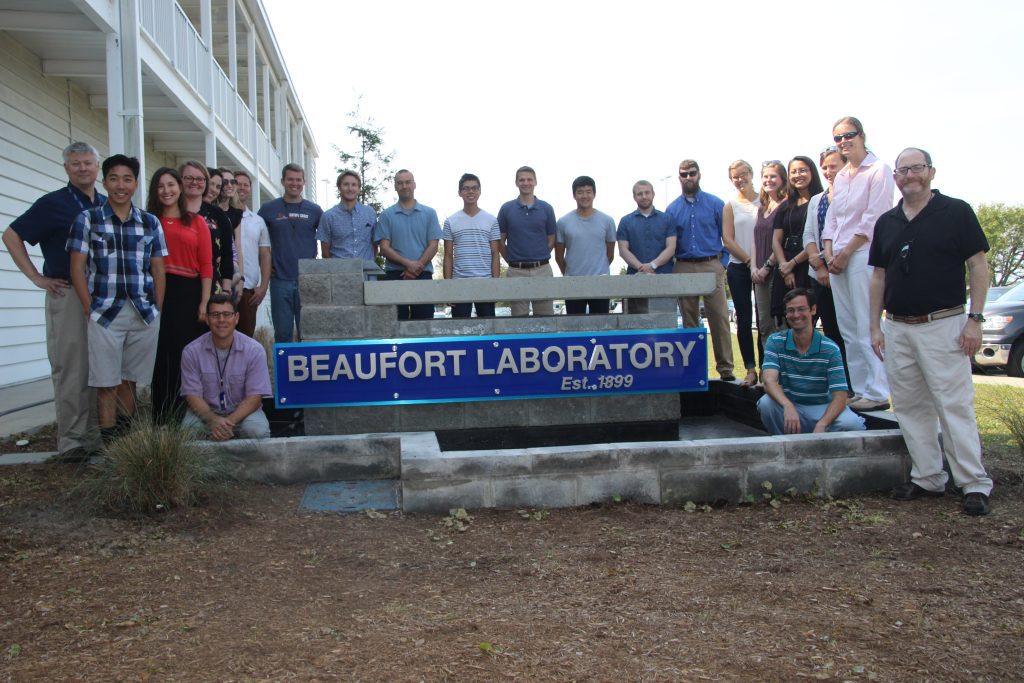
- Read the announcement of 2023 NMFW-Sea Grant Fellows
- NMFS-Sea Grant Joint Fellowship Overview 2023 (PDF download)
Meet the 2023 Fellows
How to apply, contact your state program.
Click here to find your state program and begin the application process.
Review the Fellowship Student Guide
Click here to download the 2024 NMFS-Sea Grant Fellowship Student Guide.
Review the Student Applicant Guide to Sea Grant Fellowships
Click to download the Student Applicant Guide to Sea Grant Fellowships (pdf) for application preparation tips.
Join the NMFS-Sea Grant 2024 Fellowship informational webinar on November 13, 2023 at 2 PM ET. Register here .
Join office hours, where anyone can ask questions, on november 14, 2023 from 12-1 pm et and 3-4 pm et. attend here ., eligibility.
The NMFS-Sea Grant Fellowships are available to U.S. citizens who are graduate students enrolled in or provisionally accepted to Ph.D. degree programs in academic institutions in the United States and its territories. Only U.S. citizens are eligible to apply. Foreign Nationals are not eligible.
Length of Fellowship
The fellowship can provide support for up to three years for highly qualified graduate students working towards a Ph.D. in quantitative programs including ecology, ecosystem ecology, population dynamics or related fields of study such as wildlife biology, fishery biology, marine biology, quantitative ecology, applied mathematics, applied statistics, simulation modeling, marine resource economics, natural resource economics, or environmental economics.
Students should submit applications to a Sea Grant Program. Student applications are due to Sea Grant Programs by 5:00 pm local time on January 25, 2024.
Population and Ecosystem Dynamics Federal Funding Opportunity The NMFS-Sea Grant Fellowship Program in Population and Ecosystem Dynamics anticipates funding at least four new Ph.D. fellowships in 2024 to students who are interested in careers related to marine ecosystem and population dynamics. The emphasis will be on the research and development of quantitative methods for assessing the status of marine ecosystems; managed fish, invertebrates, and other targeted species; and marine mammals, seabirds, and other protected species.
Marine Resource Economics Federal Funding Opportunity The NMFS-Sea Grant Fellowship Program in Marine Resource Economics anticipates funding at least one new Ph.D. fellowship in 2024 to students who are interested in careers related to the development and implementation of quantitative methods for assessing the economics of the conservation and management of living marine resources.
For a list of required application materials and evaluation criteria, see the 2023 NMFS-Sea Grant Fellowship Student Guide .
Award and Expenses
The award for each Fellowship, contingent upon the availability of federal funds, will be in the form of a cooperative agreement of up to $62,500 in federal funding plus at least 20% matching funding per year. This fellowship can provide support for up to three years. The award provided to each Fellow is for stipend, tuition, fees, equipment, supplies, and travel necessary to carry out the proposed research and to attend the annual Fellows meeting (at rotating locations).
Connecting with Sea Grant programs and NOAA Fisheries Science Centers
Applicants are strongly encouraged to reach out to the Sea Grant program in their state/territory at least one month prior to the state application deadline to receive application support and provide notification of intent to apply.
Applicants enrolled towards a degree in a graduate program in a state or territory served by a Sea Grant Program must submit to that program. Applicants in states or territories without a Sea Grant program must submit their applications to the Sea Grant program to which they were referred to by the NMFS-Sea Grant Fellowship Program Manager, who can be reached at [email protected] or (240) 507-3712.
To help achieve the goals of the fellowship, each Fellow will be required to work closely with an expert (mentor) from NOAA Fisheries who may provide data for a fellow’s thesis, serve on the fellow’s committee, and/or host an annual summer internship at the participating NOAA Fisheries facility. Mentors will be from participating NOAA Fisheries Science Centers or offices. Staff lists and recent publications for each of the NOAA Fisheries Science Centers are listed on each Center’s website, linked below. Applicants in the Great Lakes region or in an area without a NOAA Fisheries Science Center may contact a potential mentor whose research aligns with their own.
Alaska Fisheries Science Center ( staff , publications ); Northwest Fisheries Science Center ( staff , publications ); Southwest Fisheries Science Center ( staff , publications ); Northeast Fisheries Science Center ( staff , publications ), Southeast Fisheries Science Center ( staff , publications ); Pacific Islands Fisheries Science Center ( publications )
For more information, please contact your local Sea Grant Program or [email protected] / (240) 507-3712.
Annual Research Symposium
Funding news & announcements.
NMFS-Sea Grant Graduate Fellows are required to participate in an annual Research Symposium, which takes places at a different NMFS Lab each year. Fellows are asked to update the group on the progress of their research, with first year Fellows giving posters, and second and third year Fellows giving presentations. NMFS Scientists and Sea Grant staff also attend and participate, giving the Fellows the opportunity to hear about the cutting edge research being done at the NMFS Lab and the outstanding work conducted by the state Sea Grant program. Most importantly, the Symposium provides each Fellow with feedback at critical stages of their research by their peers and NMFS scientists. Field trips, lab tours, and socials also round out the Symposium, providing plenty of time to network with each other and the NMFS and Sea Grant participants.
The 2023 NMFS-Sea Grant Fellowship Research Symposium was held this year in Silver Spring, Maryland, from July 31-August 2, 2023. This event offered the opportunity to learn from our fellows as they shared their research in marine resource economics and population and ecosystem dynamics. Additionally, it was a chance for NOAA employees to engage and network with our future workforce. All of NOAA and faculty mentors were invited and encouraged to attend.
Agenda | Book of Abstracts
Book of Abstracts – 2022 NMFS-Sea Grant Research Symposium (PDF)
A combined 2020 and 2021 NMFS-Sea Grant Research Symposium took place virtually
Book of Abstracts – 2019 NMFS-Sea Grant Research Symposium (PDF)
Book of Abstracts – 2018 NMFS-Sea Grant Research Symposium (PDF)
Book of Abstracts – 2017 NMFS-Sea Grant Research Symposium (PDF)
Book of Abstracts – 2016 NMFS-Sea Grant Research Symposium (PDF)
Book of Abstracts – 2015 NMFS-Sea Grant Research Symposium (PDF)
Book of Abstracts – 2014 NMFS-Sea Grant Research Symposium (PDF)
2022 Fellows
2021 fellows, 2020 fellows, fellowship alumni, 2019 fellows.
Population and Ecosystem Dynamics Fellow California Sea Grant Southwest Fisheries Science Center, Santa Cruz NOAA Mentor: Stephan Munch
Claire Rosemond Population and Ecosystem Dynamics Fellow Oregon Sea Grant Northwest Fisheries Science Center, Seattle and Newport NOAA Mentors: Jason Cope and Aaron Berger
Emily Liljestrand Population and Ecosystem Dynamics Fellow Michigan Sea Grant Northeast Fisheries Science Center, Woods Hole NOAA Mentor: Jonathan Deroba
Population and Ecosystem Dynamics Fellow Washington Sea Grant Alaska Fisheries Science Center, Seattle NOAA Mentor: James Thorson
Population and Ecosystem Dynamics Fellow Virginia Sea Grant Southeast Fisheries Science Center, Miami NOAA Mentor: Matthew Lauretta
Population and Ecosystem Dynamics Fellow Washington Sea Grant Alaska Fisheries Science Center, Auke Bay and Northwest Fisheries Science Center, Seattle NOAA mentors: Dana Hanselman and Melissa Haltuch
Population and Ecosystem Dynamics Fellow Washington Sea Grant Northwest Fisheries Science Center, Seattle NOAA mentors: Eric Ward and Christopher Harvey
Population and Ecosystem Dynamics Fellow California Sea Grant Southwest Fisheries Science Center, Santa Cruz NOAA Mentor: E.J. Dick
2015 Fellows
Name: Nicholas Ducharme-Barth Sea Grant Program: Florida Sea Grant School: University of Florida Professor: Robert Ahrens NMFS Mentor: Kyle Schertzer Research: Using VMS Data to Understand the Spatial and Temporal Dynamics of the Gulf of Mexico Reef Fish Fishery and Targeted Populations Award Ends: 2018
Fellowship: Population and Ecosystem Dynamics
Name: Mary Donovan Sea Grant Program: Hawaii Sea Grant School: University of Hawaii, Manoa Professor: Megan Donahue NMFS Mentor: Ivor Williams Research: Ecological Indicators of Coral Reefs across Multiple Spatial Scales in Hawaii Award Ends: 2018 Fellowship: Population and Ecosystem Dynamics
Name: Cecilia O’Leary Sea Grant Program: New York Sea Grant School: Stony Brook University Professor: Janet Nye NMFS Mentor: Timothy Miller Research: The Mechanistic Influence of Climate on Fish Population Dynamics and Distribution and its Implications for Spatially Integrated Stock Assessment Award Ends: 2018 Fellowship: Population and Ecosystem Dynamics
Name: Lisa Ailloud Sea Grant Program: Virginia Sea Grant School: Virginia Institute of Marine Science Professor: John Hoenig NMFS Mentor: Matthew Lauretta Research: Improving Stock assessments and Management Advice for Tunas and other Highly Migratory Species Award Ends: 2018 Fellowship: Population and Ecosystem Dynamics
Name: Quang Huynh Sea Grant Program: Virginia Sea Grant School: Virginia Institute of Marine Science Professor: John Hoenig NMFS Mentor: John Walter III, Jon Brodziak Research: Extensions and Applications of Mean Length Mortality Estimates Award Ends: 2018 Fellowship: Population and Ecosystem Dynamics
Name: Kelli Johnson Sea Grant Program: Washington Sea Grant School: University of Washington Professor: Andre Punt NMFS Mentor: Isaac Kaplan Research: Multi-Species Methods to Facilitate the Transition from Heuristics to Statistics in an Ecosystem Based Approach to Fisheries Management Award Ends: 2018 Fellowship: Population and Ecosystem Dynamics
Name: William Goldsmith Sea Grant Program: Virginia Sea Grant School: Virginia Institute of Marine Science Professor: John Graves and Andrew Scheld NMFS Mentor: Kristy Wallmo Research: Characterizing the Behavior and Preference of Anglers in the Recreational Fishery for Atlantic Bluefin Tuna (Thunnus thynnus) along the US East Coast Award Ends: 2017 Fellowship: Marine Resource Economics
Name: Andrew Carr-Harris Sea Grant Program: Rhode Island Sea Grant School: University of Rhode Island Professor: Hirotsugu Uchida NMFS Mentor: Min-Yang Lee Research: Econometric Models of Community Resilience and Regional Effects of Fishery Management: an Application to Northeast Fisheries Award Ends: 2017 Fellowship: Marine Resource Economics
2018 Fellows
Population and Ecosystem Dynamics Fellow California Sea Grant University of California Santa Cruz Project: Oceanographic effects on rockfish (Sebastes spp.) reproductive success and consequences for population https://sabrinabeyer.com/
Marine Resource Economics Fellow California Sea Grant University of California Berkeley Project: Estimating the Effectiveness of the World’s Fishing-Restricted Areas
Population and Ecosystem Dynamics Fellow Rhode Island Sea Grant University of Rhode Island Project: A bayesian state-space approach to improve projections of stock biomass for managing New England groundfish https://web.uri.edu/gso/joe-langan/
Population and Ecosystem Dynamics Fellow Maine Sea Grant University of Maine Project: Developing a management strategy evaluation framework for the Maine lobster fishery in a changing Gulf of Maine http://mackenzie-mazur.squarespace.com/
Population and Ecosystem Dynamics Fellow Virginia Sea Grant Virginia Institute of Marine Science Project: Dealing with most species: improving methodology for forming and assessing species complexes
Population and Ecosystem Dynamics Fellow Hawaii Sea Grant University of Hawaii Project: Understanding and predicting population outbreaks of the destructive coral-eating crown-of-thorns sea star, Acanthaster planci , in the U.S. Pacific Islands
Population and Ecosystem Dynamics Fellow MIT Sea Grant University of Massachusetts Dartmouth Project: Performance evaluation of qualitative and Bayesian network social-ecological models for use in an integrated system http://www.smast.umassd.edu/lab_fay/
2014 Fellows
Name: Christine Stawitz Sea Grant Program: Washington Sea Grant School: University of Washingtonk Professor: Tim Essington NMFS Mentor: Melissa Haltuch Research: Evaluating the Importance of Growth Variation in Marine Fish Population Dynamics and Stock Assessment Award Ends: 2017 Fellowship: Population and Ecosystem Dynamics
Name: Lauren Yamane Sea Grant Program: California Sea Grant School: University of California, Davis Professor: Lou Botsford NMFS Mentor: Steve Lindley Research: Quantifying the Roles of Environmental Variability and the Portfolio Effect in the Population Dynamics of the Sacramento River Fall Chinook Salmon Stock Award Ends: 2016 Fellowship: Population and Ecosystem Dynamics
Name: Allison Dedrick Sea Grant Program: California Sea Grant School: University of California, Davis Professor: Lou Botsford NMFS Mentor: Mandy Karnauskas Research: Quantifying the Interactive Effects of Ocean Acidification, Temperature Change, and Fishing Behavior on Population Dynamics and Management Decisions Award Ends: 2016 Fellowship: Population and Ecosystem Dynamics
Name: Lisa McManus Sea Grant Program: New Jersey Sea Grant School: Princeton University Professor: Simon Levin NMFS Mentor: Rusty Brainard Research: Assessing the Impacts of Connectivity on Coral Reef Metacommunity Dynamics in the Coral Triangle Award Ends: 2017 Fellowship: Population and Ecosystem Dynamics
Name: Matthew Nuttall Sea Grant Program: Florida Sea Grant School: University of Miami Professor: Elizabeth Babcock NMFS Mentor: John Walter III Research: Environmental and Ecological Influences on the Dynamics of Gulf Menhaden (Brevoortia patronus) Award Ends: 2017 Fellowship: Population and Ecosystem Dynamics
Name: Mark Stratton Sea Grant Program: Virginia Sea Grant School: Virginia Institute of Marine Science Professor: Rob LaTour NMFS Mentor: Rick Hart Research: Ecosystem Drivers of US South Atlantic Coastal Fish Stock Assessment Award Ends: 2017 Fellowship: Population and Ecosystem Dynamics
Name: Katherine Kaplan Sea Grant Program: New York Sea Grant School: Cornell University Professor: Patrick Sullivan NMFS Mentor: Dvora Hart Research: Evaluating Atlantic Sea Scallop Incidental Mortality and Habitat Effects from Bottom Fishing using the Habitat Mapping Camera System Award Ends: 2017 Fellowship: Population and Ecosystem Dynamics
Name: Laura Urbisci Sea Grant Program: California Sea Grant School: University of California, Santa Barbara Professor: Hunter Lenihan NMFS Mentor: Kevin Piner Research: Developing a New Ecosystem-Based Management Approach: Using Ecosystem Models to Calculate a Better Estimate of Population Scale for Single-Species Models Award Ends: 2017 Fellowship: Population and Ecosystem Dynamics
Name: Peter Kuriyama Sea Grant Program: Washington Sea Grant School: University of Washington Professor: Trevor Branch NMFS Mentor: Alan Hicks, John Harms Research: Integrating Hook and Line Survey Data and Ecological Observations to Improve Stock Assessments of Key Rockfish Species in Untrawable Habitats Award Ends: 2017 Fellowship: Population and Ecosystem Dynamics
Name: Benjamin Marcek Sea Grant Program: Virginia Sea Grant School: Virginia Institute of Marine Science Professor: Mary Fabrizio NMFS Mentor: Richard Brill, Joseph (Kevin) Craig Research: Individual-Based, Dynamic-Landscape Models of Marine Fishes Incorporating Ecophysiological Constraints Award Ends: 2017 Fellowship: Population and Ecosystem Dynamics
Name: Jeffrey Schrader Sea Grant Program: California Sea Grant School: University of California, San Diego Professor: Joshua Graff Zivin NMFS Mentor: Dale Squires Research: Forecasts and Adaptations Award Ends: 2016 Fellowship: Marine Resource Economics
Name: Jennifer Meredith Sea Grant Program: Washington Sea Grant School: University of Washington Professor: Chris Anderson NMFS Mentor: Amber Himes-Cornell Research: Modeling the Migration Decisions of Fish Harvesters in Rural Alaska Award Ends: 2016 Fellowship: Marine Resource Economics
2016/2017 Fellows
Caitlin I. Allen Akselrud
Sea Grant Program: Washington Sea Grant
School: University of Washington
Professor: Trevor Branch and Andre Punt
NMFS Mentor: Anne Hollowed
Research: Lowering the risk of overfishing while increasing profits for California’s most valuable fishery, California market squid
Award Ends: 2020
Sea Grant Program: Maryland Sea Grant
School: University of Maryland
Professor: Thomas Miller
NMFS Mentor: Kiersten Curti
Research: Impacts of misspecification of spatial structure of assessment and stock on reliability of reference points
Fellowship: Population and Ecosystem Dynamics
Name: Adam Hayes
Sea Grant Program: Washington Sea Grant
Professor: David Layton
NMFS Mentor: Alan Haynie
Research: Network analysis of a quota share market
Award Ends: 2019
Fellowship: Marine Resource Economics
Name: Natalie Lowell
Professor: Lorenz Hauser
NMFS Mentor: Eric Ward and Robin Waples
Research: Genetic risk assessment of native shellfish aquaculture
Name: Elizabeth Ng
Professor: Timothy Essington
NMFS Mentor: Jonathan Deroba
Research: Does predation information improve stock assessment?
Name: Cassidy Peterson
Sea Grant Program: Virginia Sea Grant
School: Virginia Institute of Marine Science
Professor: Rob Latour
NMFS Mentor: Enric Cortes
Research: Management Strategy Evaluation of Highly Migratory Coastal Sharks
Name: Megan Winton
Sea Grant Program: MIT Sea Grant
School: University of Massachusetts, Dartmouth
Professor: Gavin Fay
NMFS Mentor: Benjamin Galuardi
Research: Integrating telemetry data to improve abundance estimates and management advice for a highly migratory marine predator
Name: Cassie Finer
Sea Grant Program: Oregon Sea Grant
School: Oregon State University
Professor: David Lewis
NMFS Mentor: Cameron Speir
Research: Dike removal and salt marsh restoration for fish habitat: Estimating the effects on coastal land markets
Award Ends: 2018
Fellowship: Marine Resource Economics
Name: Charles Waters
Professor: Naish
NMFS Mentor: Jeff Hard Research: Modeling the effects of inbreeding in salmon hatcheries on the eco-evolutionary dynamics of supplemented wild populations
Award Ends: 2018
Name: Dan Ovando
Sea Grant Program: California Sea Grant
School: University of California, Santa Barbara
Professor: Costello & Gaines
NMFS Mentor: Jason Cope
Research: A Bayesian framework for utilizing fishery independent Marine Protected Area monitoring data in stock assessments
Name: Erin Bohaboy
Sea Grant Program: Mississippi-Alabama Sea Grant
School: University of South Alabama
Professor: William Patterson
NMFS Mentor: Shannon Cass-Calay
Research: Modeling the Effects of Release Mortality Mitigation in the Gulf of Mexico Recreational Reef Fishery: Red Snapper
Award Ends: 2019
Name: Mikaela Provost
School: University of California, Davis
Professor: Louis Botsford
NMFS Mentor: Michael O’Farrell
Research: Sensitivities of West Coast fish stocks to environmental variability, and their use in management
Name: Robert Dunn
School: San Diego State University/University of California, Davis
Professor: Hovel/Baskett
NMFS Mentor: Steve Munch
Research: Analysis of size-structured predation and multi-trophic level harvest using stage-structured and integral projection models
Name: Zack Oyafuso
Sea Grant Program: Hawaii Sea Grant
School: University of Hawaii
Professor: Erik Franklin
NMFS Mentor: Jon Brodziak
Research: Transitioning stock assessments of commercially important Hawaiian demersal fish species through age-structured assessments
Name: Brandon Chasco
Sea Grant Program: Oregon Sea Grant
School: Oregon State University
Professor: Selina Heppell
NMFS Mentor: James Thorson
Research: Integrated spatial, temporal mixed-effects models: leveraging stock assessment techniques for threatened and protected species.
Name: Anna Birkenbach
Sea Grant Program: North Carolina Sea Grant
School: Duke University
Professor: Martin Smith
NMFS Mentor: Min-Yang Lee
Research: Structural modeling of transitions to catch shares
2013 NMFS-Sea Grant Fellows
2012 nmfs-sea grant fellows, 2011 nmfs-sea grant fellows, 2010 nmfs-sea grant fellows, 2009 nmfs-sea grant fellows.
Melissa Hedges (LA) – Population and Ecosystem Dynamics Mark Henderson (VA) – Population and Ecosystem Dynamics Patrick Kilduff (CA) – Population and Ecosystem Dynamics Jocelyn Lin (WA) – Population and Ecosystem Dynamics Patrick Lynch (VA) – Population and Ecosystem Dynamics Skyler Sagarese (NY) – Population and Ecosystem Dynamics James Thorson (WA) – Population and Ecosystem Dynamics Ben Gilbert (CA) – Marine Resource Economics Chris Keneddy (FL) – Marine Resource Economics
2008 NMFS-Sea Grant Fellows
Dovi Kacev (CA) – Population and Ecosystem Dynamics Brandon Puckett (NC) – Population and Ecosystem Dynamics Kevin See (WA) – Population and Ecosystem Dynamics Taylor Chapple (CA) – Population and Ecosystem Dynamics Steven Saul (FL) – Population and Ecosystem Dynamics Teresa Stafford (TX) – Marine Resource Economics Stephen Kasperski (MD) – Marine Resource Economics
2007 NMFS-Sea Grant Fellows
Kiersten Curti (RI) – Population and Ecosystem Dynamics Carey McGilliard (WA) – Population and Ecosystem Dynamics Ming-Yang Lee (IL-IN) – Marine Resource Economics Elizabeth Smith (RI) – Marine Resource Economics
2006 NMFS-Sea Grant Fellows
Amanda Bradford (WA) – Population and Ecosystem Dynamics Robert Leaf (VA) – Population and Ecosystem Dynamics Cameron Speir (IL-IN) – Marine Resource Economics Matthew Freeman (RI) – Marine Resource Economics
2005 NMFS-Sea Grant Fellows
2004 nmfs-sea grant fellows, 2003 nmfs-sea grant fellows, 2002 nmfs-sea grant fellows, 2001 nmfs-sea grant fellows, 2000 nmfs/sg fellows.
10 PhD Students Named 2023-24 Prize Teaching Fellows
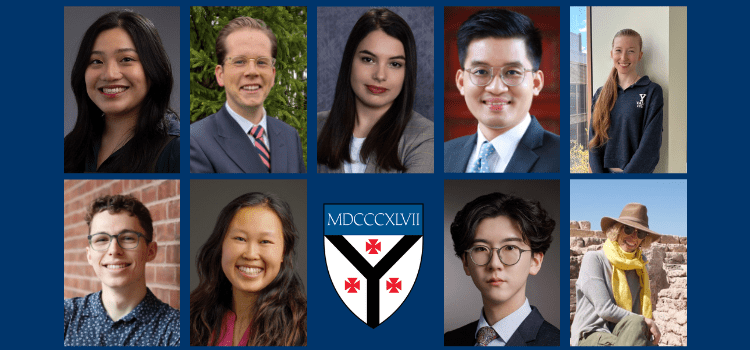
Ten PhD students from the Graduate School of Arts and Sciences (GSAS) have been named Prize Teaching Fellows for the 2023-2024 academic year: Camille Angelo (Religious Studies), Carissa Chan (Microbiology), Grayson Hoy (Chemistry), Nghiem Huynh (Economics), Kimberly Lifton (Medieval Studies), Benjamin Schafer (History), Jillian Stallman (Economics), Audrey Tjahjadi (Anthropology), Alexa Williams (Chemistry), and Novak Yang (Immunobiology).
The Graduate School has awarded the teaching prizes annually since 2000. Recipients are nominated by their undergraduate students and the faculty members they assist while serving as Teaching Fellows.
"Doctoral education is more than just a journey from knowledge acquisition to knowledge creation," said Lynn Cooley, Dean of the Graduate School. "It is fundamentally about equipping scholars with the ability to share their insights broadly—to impact society positively through education. Reviewing the nominations, I am profoundly impressed by the innovative and engaging ways in which our teaching fellows have made complex ideas accessible and exciting to their students."
Biographies of the winners are included below.
Camille Leon Angelo (Religious Studies)
Camille Leon Angelo is a sixth-year PhD student in the Department of Religious Studies in the subfields of Eastern Mediterranean and West Asian Religions and Ancient Christianity. Her work examines materiality, sexuality, and space in late antiquity through new materialist, feminist, and queer lenses. She is a field archaeologist and has excavated in the eastern Mediterranean and the Caucasus. Her current research primarily engages archaeological, papyrological, and epigraphic evidence, related to late antique Egypt. Her past projects have analyzed the archaeological remains of several early Christian sites in the eastern Mediterranean and North Africa, most notably Dura-Europos, to elucidate sensory experiences in late antiquity.
Carissa Chan (Microbiology)
Carissa Chan is a fifth-year PhD candidate in Microbiology. Her research investigates how bacterial pathogens adapt to infection-relevant stresses, thus promoting survival inside mammalian host cells and disease. She has served as a teaching fellow for Physiological Systems for the past three years, including two as head teaching fellow. Each year, Carissa is inspired by the dedication and level of engagement from students in the class as they cover fascinating topics about the human body from fundamental cellular physiology to complex interactions between organ systems. Working with undergraduate and graduate students in Physiological Systems and sharing her excitement for science with them has been one of the highlights of her time at Yale.
Grayson Hoy (Chemistry)
Grayson Hoy is a first-year PhD student in the Chemistry Department. His research focuses on using super-resolution infrared microscopy to study metabolism in living cells to better understand metabolic dysregulation. Before Yale, he attended William & Mary, where he learned how transformative professors and mentors can be from a student’s perspective. Inspired by his undergraduate researcher professor, Dr. Kristin Wustholz, and other teachers throughout his life, Grayson aims to create a supportive learning environment where students feel empowered and excited by chemistry.
Nghiem Huynh (Economics)
Nghiem Huynh is a doctoral candidate in Economics at Yale University, graduating in May 2024. His research evaluates the effects of government policies on regional and gender inequality. Nghiem holds a BA in Economics and Mathematics from New York University Abu Dhabi.
Kimberly Lifton (Medieval Studies)
Kimberly Lifton is a PhD candidate in the Medieval Studies program. She studies how Burgundy, England, and France's relationships with the Ottoman Empire materialized in manuscripts during the fifteenth century. Her research has been supported by the Fulbright, FLAS, and the Dhira Mahoney Fellowship. In the classroom, she works to develop compassionate pedagogy for neurodiverse students.
Benjamin Schafer (History)
Benjamin Schafer is a PhD candidate in American History. He studies urban and social history in the late-twentieth-century United States. His dissertation, “Life and Death in Rust,” is a study of poverty and inequality in post-industrial Buffalo, NY, his hometown, from the late 1970s to the early 2000s. Prior to Yale, Ben received an AB, magna cum laude with highest honors; Phi Beta Kappa, in History with a secondary in African American Studies from Harvard College, where he was awarded the Thomas T. Hoopes Senior Thesis Prize, the David Herbert Donald Prize in American History, and the Rev. Peter J. Gomes Prize in Religion and Ethnicity. He also holds an MPhil in Economic and Social History from Emmanuel College, University of Cambridge. He works as a research assistant for Professors Elizabeth Hinton and Vanessa Ogle and has previously worked as a researcher for Professor Fredrik Logevall (Harvard) and the John F. Kennedy Library Foundation. He has been a teaching fellow for Professor David Engerman (Fall 2023, The Origins of U.S. Global Power) and Professor Marco Ramos (Spring 2023, The History of Drugs in America).
Jillian Stallman (Economics)
Jillian Stallman is a PhD student in the Economics Department interested broadly in the intersection of economic development, environmental economics, and political economy. She's writing her dissertation about cooperation over freshwater resources in developing countries using a combination of economic theory, surveys and administrative data, and remote-sensing measurements. Jillian spent her undergraduate years at Williams College, where she worked most semesters as a teaching assistant to her peers in courses ranging from macroeconomic development to multivariable calculus to introductory Chinese. After graduating, she spent several years travelling in, among other places, China, Chile and Senegal, operating under the belief that she would have a difficult time ultimately doing research about places and people she hadn't lived around for a good while.
Audrey Tjahjadi (Anthropology)
Audrey Tjahjadi is a third-year PhD student in the Department of Anthropology focusing on human evolutionary genetics. She is interested in how local environments have shaped the evolution of diet-related adaptations in Southeast Asian and Oceanic populations, particularly in genes involved in fatty acid metabolism. Outside of research, Audrey is also involved in science communication and outreach through Yale graduate student organizations.
Alexa Kim Williams (Chemistry)
Alexa Williams is a PhD student in Materials Chemistry. She completed her BS in Chemistry in 2021 at Montclair State University in New Jersey. At Yale, her research explores the fundamental reactivity of H-terminated silicon nanoparticles and aims to inform broader studies on silicon-based hybrid materials for CO2 reduction. This work is part of the CHASE solar fuels hub.
Xuan (Novak) Yang (Immunobiology)
Novak Yang is a third-year PhD candidate in Dr. Lieping Chen’s laboratory at the Department of Immunobiology. He received his BS in Biology and MS in Cancer Biology and Translational Oncology degrees at Emory University, and was the first to accomplish this in a “3+1” timeline at Emory. Prior to joining Yale, Novak was trained by Dr. Haian Fu and Dr. Andrey Ivanov at the Department of Pharmacology and Chemical Biology, Emory University School of Medicine, with a primary focus on cancer-associated protein-protein interactions and high-throughput drug discovery. He has multiple first-author and co-author publications, and is the recipient of American Society for Pharmacology and Experimental Therapeutics (ASPET) Travel Award and Program Committee Blue Ribbon Pick, and Society for Laboratory Automation and Screening (SLAS) Tony B. Academic Travel Award. Novak was recruited to Yale Immunobiology in 2021 as a Gruber Science Fellow. His research focuses on the discovery of actionable targets in the tumor microenvironment that drive the resistance to current immunotherapies, and pre-clinical development of innovative therapeutic strategies that normalize anti-tumor immunity for cancer patients.
Current Students
- Student Survival Guide
- Career Success Initiatives
- Undocumented Students
- The LGBTQI+ Community
- Students With Conviction Records
- Students With Disabilities
- Transfer Explorer
Faculty & Staff
- Employee Directory
- Human Resources
- Faculty Resources
- Academic Commons
- University Benefits Office
Future Students
- CUNY’s Value for Students
- How to Apply
- Our Academic Programs
- Check Application Status
- Guide for Future Students
- International Students
- Campus Tours
Degree Search
- Find a Course
- Find a Class
- Find a Program
People Search
- Find People (phone/emails)
- College Registrars
- Campus IT Help Desks
- Academic Calendars
- Meet the 2023-2024 TS3 Graduate Fellows
- CUNY Office of Research
- Research Development & Programs
- Student Programs
- Undergraduate Programs
- Transfer to STEM Student Success (TS3)
Meet the TS 3 Graduate Fellows
One of the integral aspects for the success of the TS3 program is the identification and appointment of TS 3 graduate fellows on each CUNY campus. In collaboration with the campus directors, 4 graduate fellows were selected at each respective campus: City College, Hunter College, Lehman College, and Queens College. Their goal is to act as a mentor for students during their first academic year as a transfer student and offer professional development workshops to prime them for a smoother transition. Meet our cohort below:
2023-2024 Graduate Fellows

Ezekiel Willerson
Queens College
Behavioral and Cognitive Neuroscience Ph.D. Candidate
My path in academia (and life!) has not always been linear. With little formal education past 8th grade, I obtained my GED at 18. From there, I attended a local community college for 1 year, before joining a small, unaccredited seminary school. When I finally joined City College (undergraduate alma matter), it was as an English major. Through elective courses in psychology and neurobiology, I discovered a love for understanding the mind and the mechanics of the brain. I soon joined a neuroscience lab at City College, studying the affects of alcohol on fear memory in rats. I was hooked.
I received my English BA from City, and further obtained a BS in psychology. Now, I am working on my PhD in Behavioral and Cognitive Neuroscience. I currently research non-neuronal components of chronic pain, looking at microglia and astrocytes (glia cells) and the makeup of one fascinating component of the extracellular matrix – the perineuronal net.
I joined TS3 as a grad fellow because I am only here now, studying what I am (and loving it!), because I had some stupendous mentors who helped guide along my wandering journey. If I can be a little of that help to someone else, then I would gladly jump at the chance.
I’m a 5th year physics PhD student at the CUNY Graduate Center specializing in high energy theory – an area of mathematical physics dealing with the intersection between special relativity and quantum mechanics. My specific research deals with the use of a complex parametrization of gauge fields as a way of gaining insights into the notoriously difficult-to-deal-with low energy scale of quantum chromodynamics (the theory describing the strong interactions between quarks and gluons). It is a fascinating field of physics that remains elusive after more than 50 years of research and I would highly recommend it to any mathematically-oriented students. I never thought that I would be pursuing academia and research, but it can be very fun and worth trying out. Being a TS3 graduate fellow is a great way of balancing out the day-to-day of abstract research with the more human-oriented work of mentoring. It’s great fun to get to know a group of people and work together on the various aspects of figuring out undergraduate life.

Antonina Maj
Lehman College
Physics Ph.D. Candidate

Carol Badre
Hunter College
Geometric Group Theory and Low-Dimensional Topology Ph.D. Candidate
I am a second year PhD student at The CUNY Graduate Center. I am interested in geometric group theory and low-dimensional topology. I also have some background in knot theory, CAT(0)-cube complexes and trisections. In the past I have been interested in the interplay between non-positively curved and arboreal spaces and the resulting structure and decomposition of the groups that act on these spaces. I have previously studied mathematics at The University of Melbourne and The University of Sydney. I enjoy drawing and visualizing mathematics, primarily by hand and also by programming.
I was delighted upoin the success of my application for the PhD program at the CUNY graduate center. The CUNY graduate center has a wealth of experts in the fields of geometry, topology and geometric group theory- New York is a thriving hub of mathematical research and community and I have been privileged enough to participate in this. It has been a long journey for me to reach this position that at times appeared to not be possible, and in those experiences I greatly identify with the TS3 students and the program more generally. Hurdles and pitfalls are obstacles that often dissuade and discourage and through my teaching, I attempt to show that these moments should not be the end of anyone’s story or drive. Everyone should be given multiple opportunities to accomplish and pursue their hopes and dreams, and creating a welcoming environment in which students feel a sense of belonging is of the utmost importance.
Being a TS3 graduate fellow has been a rewarding experience. I have met a group of young people who are very capable, creative and thoughtful. I have enjoyed our conversations and discussions and have found the position of being a mentor an enriching experience. I have had many important mentors in my life and the act of being on the other side of this mantle is one that I treasure.
I’m a graduate student and working as a research assistant at Smart Grid Interdependency Lab at The City College of New York (CCNY) under the supervision of Professor Ahmed Mohamed. My research interests include power system dynamics, distributed renewable energy systems, microgrids, smart grids. Research has always been my passion and fortunately, I found the opportunity to pursue it at CCNY through a program known as “US-Pakistan Knowledge Corridor”. As we know, ups and downs are part of life. I have also faced a lot of difficulties during my academic journey till now and I am learning to embrace challenges as opportunities with a positive mindset. I joined TS3 because I believe that students can exploit the best of their capabilities if they are motivated. Therefore, I just want to help them. If I could make a little bit of a difference to someone’s journey, I would consider myself fortunate enough.

City College
Electrical Engineering Ph.D. Candidate
2023-2024 Gessell Fellowship for Research in Social Ethics
Other pages in this section:
Gessell Fellowship Recipient Presents Research on Tennessee School Funding
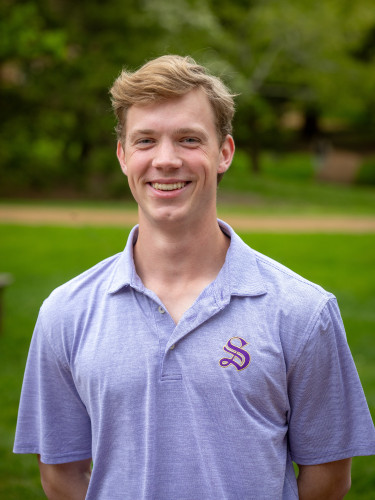
When Tennessee Governor Bill Lee signed the bill into law, the state touted this new funding reform as a means to increase per-capita funding in Tennessee public schools and to address gaps in resources between urban and rural school districts. Miller’s study evaluated whether TISA had begun to fulfill its promise. He interviewed public educators from across Southeastern Tennessee to understand their perceptions of TISA’s efficacy and what TISA might mean for the future of Tennessee rural public education. The study included data from seven one-time interviews that generated qualitative research-derived themes that were then analyzed using emergent thematic coding. The study found that familiarity with TISA was low among educators and that the State of Tennessee had neglected to train or update its educators on TISA and how the law will affect their lives, the lives of their students, and their school districts. Miller also found that the public educators he interviewed were vehemently opposed to tying funding to standardized testing performance, one aspect of TISA. Despite TISA increasing resources in Tennessee public schools and raising the salaries of public educators, the study’s participants were pessimistic that the law would improve rural public education across the state. Several respondents thought that although TISA could help, it neglects to significantly remedy resource and educator recruitment challenges that rural public schools face.
Miller’s increased knowledge about TISA enabled him to take on two tasks to deepen familiarity with TISA among educators and to meet some fiscal needs in one rural public school. He is currently building a website with Dr. Christopher Silver of the Sewanee Psychology Department that will run for two years and will centralize information the state has posted regarding TISA. The website will be shared with the faculty of Marion County Schools to bring information regarding TISA to educators and allow them to fully understand the new reforms. Miller also wrote a $950 grant from the Bonner Foundation to provide Richard Hardy Memorial School in South Pittsburg with science lab equipment.
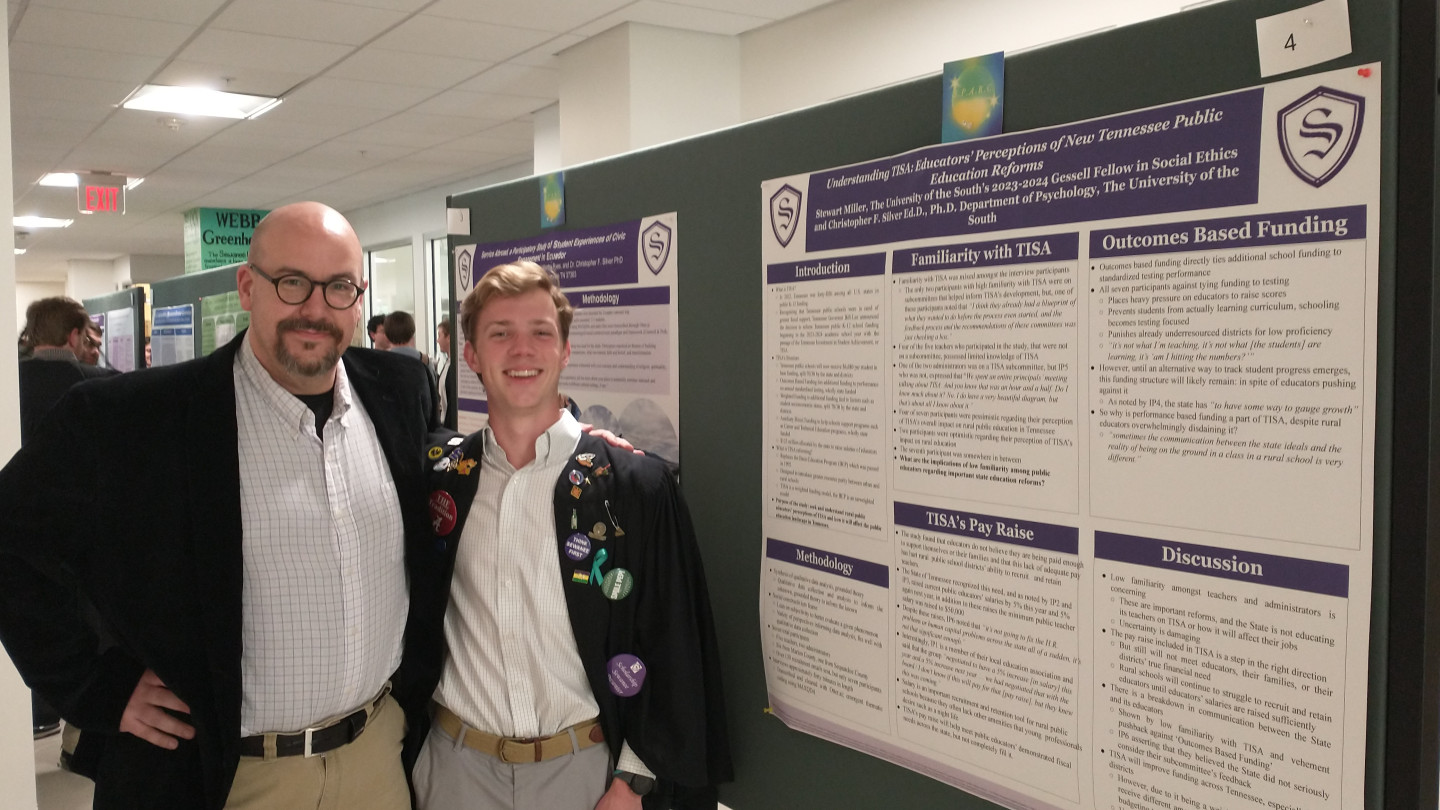
On April 11, 2024, Miller presented the findings from his year-long research project to the Sewanee community. He then participated in Scholarship Sewanee on April 26, 2024, sharing his research through a poster session. He is grateful to Dr. Christopher Silver for mentorship throughout the year-long project, and to the Gessell Fellowship for financially supporting his project.
Graduate Programs


Current time by city
For example, New York
Current time by country
For example, Japan
Time difference
For example, London
For example, Dubai
Coordinates
For example, Hong Kong
For example, Delhi
For example, Sydney
Time difference between Recife, Brazil and Elektrostal, Moscow Oblast, Russia
Recife, brazil, elektrostal, russia.

IMAGES
VIDEO
COMMENTS
The purpose of the NSF Graduate Research Fellowship Program (GRFP) is to help ensure the quality, vitality, and diversity of the scientific and engineering workforce of the United States. A goal of the program is to broaden participation of the full spectrum of diverse talents in STEM. The five-year fellowship provides three years of financial ...
General inquiries regarding the Graduate Research Fellowship Program should be made to: Graduate Research Fellowship Operations Center, telephone: 866-NSF-GRFP, 866-673-4737 (toll-free from the US and Canada) or 202-331-3542 (international). email: [email protected]. Contact: GRF Operations Center.
GRFP 2019-2023 . The Graduate Research Fellowship Program (GRFP) is the National Science Foundation's first program, launched shortly after Congress established the agency in 1950, with the directive to recruit high-potential individuals early in their careers to pursue graduate research training in science, technology, engineering, and mathematics (STEM).
October 16, 2023. Life Sciences. October 17, 2023. Computer and Information Science and Engineering, Materials Research, Psychology, Social Sciences, STEM Education and Learning ... Refer to NSF Graduate Research Fellowship Program Administrative Guide for Fellows and Coordinating Officials for restrictions on the use of the cost-of-education ...
The Graduate Research Fellowship Program (GRFP) recognizes and supports outstanding graduate students who are pursuing research-based master's and doctoral degrees in science, technology, engineering, or math (STEM) at accredited US institutions . Refer to the NSF GRFP program page for guidelines, announcements, and other programmatic information.
Individuals who do not intend to enroll or be enrolled in a research-based graduate degree program at a non-profit institution of higher education accredited in, and having a campus located in, the United States, its territories, or possessions, or the Commonwealth of Puerto Rico, in an eligible Field of Study in STEM or STEM education (see ...
The Graduate Research Fellowship Program, or GRFP, is one of NSF's oldest programs. Fellowships were first awarded in 1952 and predate NSF's first awards for research grants. GRFP is a prestigious program that supports outstanding graduate students pursuing research-based master's and doctoral degrees in over 100 NSF-supported STEM fields.
The National Science Foundation's (NSF) Graduate Research Fellowship Program (GRFP) provides three-year graduate research fellowships in science, mathematics and engineering, including Women in Engineering and Computer and Information Science awards. Fellowships are awarded for graduate study leading to research-based master's or doctoral ...
NSF GRFP Goals The OVERALL GOAL of the Graduate Research Fellowship Program is to recruit individuals into Science, Technology, Engineering, and Mathematics (STEM) fields 6 •To broaden participation in science and engineering of underrepresented groups, including women, minorities, persons with disabilities, and veterans
Interested in learning more about the Fellowship Program? Register for and attend the following upcoming webinar: We will be hosting a presentation on Tuesday, April 25, 2023 at 11am providing an overview of the NSF GRFP at MIT! Sign up below. This presentation is great for any of the following: Students recently awarded an NSF GRFP Fellowship
Applicants can apply multiple times as Level 1 OR 4. Applicants can apply once as Level 2 or 3. Academic Level. Description. Level. Undergraduate Student. Current senior; never enrolled in a graduate degree program, ready to enroll full-time by Fall 2024. Level 1. Not Enrolled: Bachelor's Degree, no graduate degre.
The National Science Foundation (NSF) has announced the 2023 Graduate Research Fellowship Program (GRFP) awardees. Seven recipients of this award are or were CCS undergraduates. The College extends its congratulations to all of the CCS and other UCSB recipients with wishes for much success as they embark on their future endeavors as experts in their fields, contributing to the well-being of ...
Jun 13, 2023, 4:34 PM. Share. The National Science Foundation has selected 28 Vanderbilt students for its 2023 Graduate Research Fellowship Program. The NSF GRFP supports outstanding graduate ...
15PNIJ-23-GG-01930-RESS. Open. Funding First Awarded. 2023. $136,485. Date Created: January 18, 2023. The Graduate Research Fellowship (GRF) program provides grants to accredited academic institutions to support outstanding doctoral students whose dissertation research is relevant to criminal and or juvenile justice.
NSF Graduate Research Fellowship Program (GRFP) Supplemental Funding Project Opportunities - EPA ProgramOverview: TheNational Science Foundation (NSF) GraduateResearch FellowshipProgram(GRFP) INTERN is a supplemental funding opportunity programthatallows for GraduateResearchFellows through NSF to apply for supplemental funding for professional ...
The National Science Foundation Graduate Research Fellowship Program, or NSF GRFP, announced its 2023 cohort and it includes 14 awardees and three honorable mentions who are current UCR undergraduates, graduates, or alumni. NSF GRFP supports a diverse selection of graduate students pursuing a full-time, research-based master's and doctoral degree in science, technology, engineering, and ...
Funding for 3 years of graduate study in research-based master's and doctoral programs in science, technology, engineering and math (STEM) and STEM education. A campus nomination is not required for this award, but prospective applicants should contact External Fellowships about SBU's NSF GRFP Application Accelerator.
The awardees and honorable mentions for the 2024 NSF Graduate Research Fellowship Program (GRFP) competition were recently posted and several Biology students were recognized. MCBB PhD student Kristen Harder of the McCall Lab, Biology PhD student Dylan Mankel of the Marlow Lab, and Biology PhD student Elif Ozsen of the Chantranupong Lab were awarded with 3-year graduate research fellowships.
The fellowship recognizes and supports outstanding graduate students who are pursuing research-based master's and doctoral degrees in the U.S. The five-year fellowship includes three years of financial support, including an annual stipend of $37,000 and a $16,000 educational allowance.
As one of the most competitive scholastic programs in the U.S., it recruits high-potential, early-career scientists and engineers, and supports their graduate research training. "The NSF Graduate Research Fellowship is a great recognition of the recipients' accomplishments," says Ashlee N. Ford Versypt, associate professor in the ...
The Graduate School is assisting graduate students who wish to apply for the National Science Foundation's (NSF's) Graduate Research Fellowship Program (GRFP). Support includes Zoom workshops, a Canvas course and one-on-one writing support. The upcoming award year solicitation will be available in July at NSF's Graduate Research Fellowship Program website. Per the previous year's ...
Applicants enrolled towards a degree in a graduate program in a state or territory served by a ... The 2023 NMFS-Sea Grant Fellowship Research Symposium was held this year in Silver Spring, Maryland, from July 31-August 2, 2023. This event offered the opportunity to learn from our fellows as they shared their research in marine resource ...
The Graduate School has awarded the teaching prizes annually since 2000. Recipients are nominated by their undergraduate students and the faculty members they assist while serving as Teaching Fellows. "Doctoral education is more than just a journey from knowledge acquisition to knowledge creation," said Lynn Cooley, Dean of the Graduate School.
Meet the TS 3 Graduate Fellows. One of the integral aspects for the success of the TS3 program is the identification and appointment of TS 3 graduate fellows on each CUNY campus. In collaboration with the campus directors, 4 graduate fellows were selected at each respective campus: City College, Hunter College, Lehman College, and Queens College.
During the 2023-2024 academic year, Bonner service intern Stewart Miller conducted community based research with the support from the Gessell Fellowship for Research in Social Ethics. A junior American Studies major, Miller examined the Tennessee Investment in Student Achievement (TISA) law, which went into effect in fall 2023.
Wednesday, May 17, 2023 Recife's time zone: UTC-03:00 or -03 : 02:46 AM Thursday, May 18, 2023 Elektrostal's time zone: UTC+03:00 or MSK : Find out the distance between Recife and Elektrostal Find out the time difference between Recife and other cities Find out the time difference between Elektrostal and other cities.